#and the role one must take not to be a part of a social problem
Explore tagged Tumblr posts
Text
Keep your hands off my woman!!
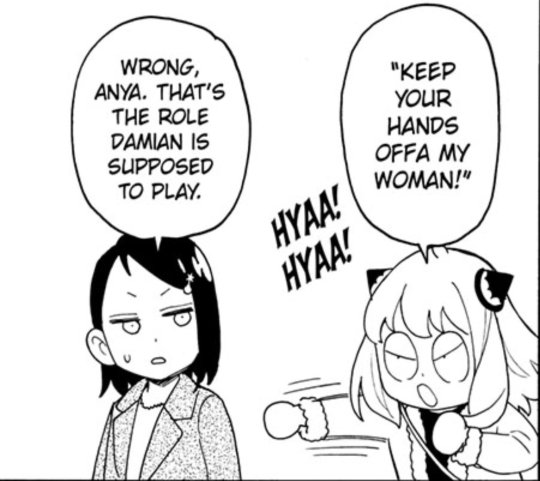
Leaving aside the most important part of the chapter, Yor must kiss her husband for world peace and the Twiyor nation to be happy.
I think it's a good message if we look deeper into how the stereotypical duality of women is portrayed to us, which I think is a message that can encompass anyone in general.
The most conventional romantic movies are usually about the man being - stereotypically - the strongest and the one who must protect the woman, who wins his sensitive heart and makes the hero bring out his sweetest feelings.
Becky being a little girl has in her heart the fantasy of a sweet romantic love just like the one in her novels and movies. But sometimes, people are not so conventional.
Both Anya and Yor, don't feel comfortable being pigeonholed into “girls waiting to be passively rescued”, because within themselves the love for the people around them is a drive to be strong, take action and save others.
I feel that one of Endo's best points, is her way of undertaking a concept of what femininity, or rather, “feminine energy”, represents. Feminine energy is a force that comes from feelings, it is fluctuating and unpredictable, sometimes like a gentle breeze and sometimes like a terrible hurricane.
Most of Endo's female characters are strong, independent women who do not need to be rescued. And they are very willing to put themselves in the face of danger to protect those they love. This is something we have seen, with characters like Yor, Sylvia, Martha, Fiona, and they have been able to save other men or take on subjects much larger and more muscular than them.
Even with girls like Anya who we know very well is a very brave girl and has been in the face of danger despite her age (maybe too much, our poor baby is only 4 to 5 years old, God), and has the strength to send a bully flying (and fall in love in the process) on the first day of school.
So …. if women are strong …. men are weak?
Absolutely not!
Everyone, regardless of gender, is strong. We know perfectly well that Twilight is someone capable of taking care of himself, is someone who is physically trained and has enormous intelligence. Even Yuri has survived so many dangers that we wonder how the hell he didn't die. Damian is a brave guy (when he doesn't see an insect lol).
The point is, even though women and men (or any gender in general) are strong. We all have our weaknesses, our sensitive sides.
You can do things on your own, but you don't have to do everything at once....
Clearly, although Yor is physically strong, she has problems with metal and verbal confrontations. Because her insecurities are so great that when they make her doubt herself and her own value, she tends to lose it and that is when Loid is there for her, not to take care of her because she is weak, but to remind her of her own value (because she doesn't seem to realize it herself) and to make her see that she is worthy of the understanding and love of others. In the same way that Yor reminds him that he too can be a little weak and take refuge in her.
Even if we feel weak and awkward, we can take initiative....
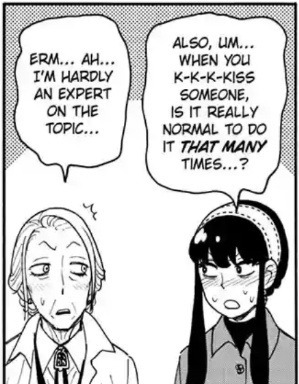
I think it is very important, the idea that Yor or anyone in general can have the “initiative” to seek on their own that “love” that you so desire.
Many times we feel that if we don't fit into the expected canon, or social archetype we are not worthy of love. (Feminine women who feel vulnerable and who depend on the guy to live are the ones who get love in the end). When nothing could be further from the truth….
Being weak and vulnerable is something totally natural and not exclusive to one gender or social role. We are all weak and strong at the core, and we need each other to complement each other and to be able to enjoy much more of our own love and the love we can give and receive from others.
Yor's desire to actively seek love (kissing her husband a lot) is not only a way to develop her bond with Loid, but a way to grow her self-esteem and challenge her insecurities. To stop seeing herself as a child in front of the world, but a woman who can get things because she wants them (and has her husband's consent, of course) (But, come on, we all know Loid needs kisses from Yor).
#Anyway...yor go home and kiss your husband#Endo is just messing with our minds because he knows we can't deal with Yor kissing Loid#spy#twiyor#spy x family#yor forger#loid forger#loid x yor#yor briar#anya forger#twilight#becky blackbell#sxf#sxf fanart#spyxfamily
239 notes
·
View notes
Text
Gensokyo through a Sociological Lens

Gensokyo. A metaphysical place where humans and youkai live together in symbiosis. A delicate balance must be held between the two species, or else it will cease to exist.
...You must have heard some variation of this phrase at least once. I mean, this is Touhou—Gensokyo is the main setting of the series after all. There’s some very interesting worldbuilding that’s been constructed over the course of many, many years.
Frequently, the community will analyze the inner workings of this place and try to explain why things are the way they are. Things are often overcomplicated by fans, however. Details get overinterpreted, and admittedly, explanations on the lore can quickly become convoluted. Concepts like “the balance of Gensokyo” or “the roles humans and youkai play” may seem quite confusing, especially since there’s nowhere in particular that functions exactly like it. And yes of course, there isn’t any specific place in the world that is a one-to-one equivalent. But that doesn’t mean Gensokyo can only be defined within its own little bubble of fiction.
How about we take a step back? Let’s just look at this world from a wider, objective perspective. Let’s view everything through a sociological lens.
Table of Contents:
What’s Sociology?
What is a Social System?
How Does Gensokyo Work?
Gensokyo as a Social System
1. Introduction: What’s Sociology?
Before we define what a social system is... What is sociology?
Just from the word alone, you can deduce it as “the study of society.” Like how society functions, how people behave, stuff like that. Which yes, is technically correct. But there’s more to the spirit of the field than that. Let me ask you this instead:
What is the point of sociology?
Most people don’t understand why this field is so important. Society... why bother studying something that we already notice everyday? We talk about it all the time, hear about it all the time. We’ve probably discussed social problems and social structures in other academic environments, such as our history or English classes. It’s just a collection of people, right? “We live in a society.”
However, when we just rely on our default mode of thinking to explain society... we run into some issues. For example, take the problem of cheating in school. Why do students cheat?
“They don’t like or don’t understand the class.”
“They either don’t like studying and doing homework, or they just forget to do them.”
“They’re just lazy, dumb, and/or dishonest.”
“They don’t care if they cheat or not.”
“They’re not trying hard enough at school.”
Well, sure. Those things may be true. But think deeper. Are there more reasons why people would cheat in school?
“They want to pass, but they’re afraid of academic and social consequences.”
“They don’t have enough time to do homework and study.”
“They assume that since other students cheat, it’s okay for them to do it too.”
“They feel like they can’t ask for help, because they either feel like no one’s there to support them, or they’re too ashamed to reach out.”
Now you’re thinking more like a sociologist! While the first list may just appear as common sense, our default judgments can often be short-sighted because we’re used to thinking individualistically. It’s easier for us to say that someone’s problem is their own fault. Even if we admit that maybe there were factors they couldn’t control, we conclude that it’s ultimately their job to deal with it.
However, these judgments lead us to blame the individual person for what is fundamentally a systemic issue. Problems don’t just begin and end with individuals; there are far larger forces at play.
This isn’t to say that individuals have no agency or impact either. Reducing problems to “The System is puppeting everyone around” ignores the fact that at the end of the day, we’re all still participants of society. We play a part in it, too.
Essentially, society is not just a collection of people, but a collection of people who exist in relation to one another.
People and systems are connected; they influence and interact with us, and we do the same with them. By recognizing this interplay, we can understand the greater social context behind the decisions we and others make.
This unique mode of thinking is what sociologist C. Wright Mills named “the sociological imagination.” This is the kind of mindset sociologists have to think in before analyzing social problems and getting to those “one in four people” statistics. Sociology is a major area of scientific study precisely because it concerns itself with a foundational aspect of the world we live in. Through this bird’s eye view, we’re able to discover further possible answers about not just what society is, but also why it is and how it works.
—
2. What is a Social System?
There are three main theoretical perspectives, or paradigms, that sociologists take into account when analyzing social phenomena:
Symbolic Interactionism
Functionalism
Conflict theory
For the sake of keeping this post focused, I will primarily examine things through aspects of functionalism. Still, keep in mind that the field is incomplete without the other two perspectives, and I will discuss them in further detail at a later date.
Through the lens of functionalism, we can define a social system as a collection of people, positions, and ideas. Social systems are everywhere and we’re always participating in them.
The important thing about social systems is that they bind people together on the basis of collective participation. In the functionalist view, society is like a living organism. The way an organism needs all its parts to function in tandem, a society needs all its people to collectively perform their roles.
Sound familiar?
It should.
—
2. How Does Gensokyo Work?
(I will state it through bullet points to get straight to the point of what it is)
Let’s summarize:
Because of humans starting to view youkai as just superstition, youkai were no longer a necessary part of human society. Youkai need fear (belief, their purpose) to exist, so their existence would cease to be. To counteract that, the sages created Gensokyo. (Forbidden Scrollery, Chapter 48) (Wild and Horned Hermit, Chapter 9)
Gensokyo exists within the Hakurei barrier, the border of common sense. The Hakurei shrine and the shrine maiden exist to maintain the barrier. (Perfect Memento in Strict Sense, Reimu’s Entry)
Humans and youkai exist in Gensokyo and live in a symbiotic relationship (Cage in Lunatic Runigate, Chapter 5)
Youkai need humans to fear them while the humans need youkai to protect the village from disaster. Without the support of youkai, the village can’t exist. Without the humans to fear them, youkai can’t exist. (Forbidden Scrollery, Chapter 48) (Wild and Horned Hermit Chapter 9)
Because of this relationship, the humans and youkai can live content and relatively peaceful lives. This is the balance of Gensokyo, it’s the status quo. (Perfect Momento in Strict Sense, monologue)
If the balance were to be disrupted or if the barrier were to cease to exist, Gensokyo would be no more. (Forbidden Scrollery, Chapter 19)
—
3. How Does Gensokyo Work?
The basics:
When you view Gensokyo through a sociological lens, the human villagers, the youkai, and the shrine maiden are statuses people are organized under in Gensokyo as a social system. For Gensokyo as a social system to function, everyone within it has to participate by fulfilling their roles. If no one were to fulfill those roles, Gensokyo would not be able to function.

(Cage in Lunatic Runagate, Chapter 5)

(Perfect Memento in Strict Sense, Reimu’s Entry)
People make social systems happen. But do you remember what I said about the sociological imagination? Social systems shape people’s lives at the same time. Again, individuals and social systems simultaneously interact with each other.
Gensokyo greatly exemplifies this concept. The collective participation from the human villagers, youkai, and shrine maiden is what makes Gensokyo happen. However, their lives are also shaped by Gensokyo.

(The Forest and The Trees by Allan G. Johnson, page 17)
When I say “shaped”, I’m referring to how social systems lay out paths of least resistance. This term refers to the path of action that would receive the least amount of pushback by society, the thing you’re expected to do of your status within a social system.
In other words, why do we keep behaving in the ways that we do? Why don’t we just do whatever we want?
Well, it’s because of social expectations. Naturally, we would rather act in accordance with them than have deal with the consequences of ignoring them. Going to work, doing your homework, laughing at a friend’s joke (even if it wasn’t very funny), etc. We follow paths of least resistance everyday.
And just like in real life, the human villagers, youkai, and shrine maiden all follow paths of least resistance laid out by their social system: Gensokyo. By doing what’s expected of their status, by performing their roles, they participate in said system.
Can you see how linked individuals and systems are with each other now? This back-and-forth relationship is clearly portrayed in Touhou.
Anyway, you may have noticed that I use the word “status” instead of just saying “them.” People are individuals, while statuses are the titles of the roles they occupy. So think about what defines the status of a human villager—what expectations and ideas are associated with it?
To put it briefly, the human villagers are expected to fear youkai because they’re far weaker in comparison and can easily killed by them. They have to stick together to survive.
Now, what are the expectations and ideas that are associated with the status of a youkai?
Youkai are meant to attack humans. They are the enemies of humans and need to be feared by them to exist (i.e. to survive).
And of course, where does the shrine maiden fit into all of this?
From what we know in Touhou, the shrine maiden is expected to exterminate youkai and protect the villagers. Her responsibility is to maintain the balance of Gensokyo and the Hakurei barrier.
These statuses will still exist if no one occupies them at the moment. Again, remember: people are not statuses and statuses are not people. I am not an employee, for example. I occupy the status of employee, meaning I exist outside of that status. The status of employee will still exist if I were to quit, and it will be occupied by someone else eventually.
Ultimately, the individual occupying the status doesn’t matter. What actually matters is that the roles associated with said status are being fulfilled.


(Silent Sinner in Blue, Chapter 20)
(Perfect Memento in Strict Sense, Reimu’s entry)
Elaborating on societies:
Social systems are everywhere, and they can exist within and next to each other. In this case, Gensokyo is a social system that contains smaller social systems within it, and within those systems exist even smaller ones, and so on.
Let’s take a closer look at this. For example, the human village itself is a social system. Within the human village there are families, shops, bars, etc., which are social systems too (yes, things like families and businesses are technically considered as such).
This idea of social systems exists with youkai too. On a micro scale, we have tengu society. Tengu society lies within the Youkai Mountain, which itself resides alongside the Forest of Magic and the Bamboo Forest of the Lost. And youkai society encompasses all of them. On the macro scale, we have Gensokyo. All of these things are social systems. And for clarification’s sake, we’re not just talking about these things as places—we’re talking about them as groups of people.
Here is a diagram I made which generally illustrates how the social systems in Touhou are organized (note: not everything is depicted here, this is just an example)

(Diagrams of social systems)
Since social systems can exist within other social systems, that also means people will occupy multiple statuses.
I’ll use myself as an example here. My family, my school, and my country are some of the social systems which I participate in. In those cases, I would be a parent’s child, a student, and a citizen. I hold various statuses at the same time, and each one is associated with a separate set of ideas and beliefs.
A resident of Gensokyo would be no different, since this concept would apply to them too.
Let’s take Aya for instance. Aya exists within three primary social systems: Gensokyo, youkai society, and tengu society. Within each of those social systems, she occupies a distinct status.
In Gensokyo, she is a youkai. Specifically in youkai society, she is a tengu. And even more specifically in tengu society, she is a crow tengu.
Each of these statuses she occupies is associated with a certain role. The status of youkai is associated with the role of attacking and scaring humans. Moreover, the status of tengu is associated with the idea of causing great winds. Last but not least, crow tengu are defined by their role of writing and distributing newspapers.
The statuses of youkai, tengu, and crow tengu have different ideas attached to them. This eventually leads to the formation of distinct types of relationships, which are defined by those idea (e.g. what a relationship between a child and their parent would look like compared to a student and their teacher; I’ll get into this later). You could say there is a wide variety of people just as there is a wide variety of youkai.
This may ring a bell. That’s because this is exactly what Aya describes in her conversation with Kosuzu in Forbidden Scrollery. According to Chapter 49, she says, “It seems that to humans, tengu are just one of many kinds of youkai, but to the tengu there are plenty of different kinds of humans too.” She then adds, “And we have different feelings about each of them, which gives rise to entirely different relationships.”

(Forbidden Scrollery, Chapter 49)
Remember how I said social systems weren’t just places, but groups of people? ...So why in the rest of this page is Aya describing a human’s status according to specific locations? Instead, shouldn’t it be something purely conceptual?
Well, that’s because we participate in a variety of systems. So logically, we would occupy different types of statuses.
There are statuses that we are just born into such as race, gender, and family. There are also statuses we attain as we move through life; “teacher,” “student,” “scientist,” “manager,” and “parent” are all examples of this. And there are other statuses that we don’t occupy all the time because they exist only in particular situations.
In his book The Forest and The Trees, Johnson uses the ideas of a pedestrian and a bus passenger as an example. When he steps off the sidewalk and enters the bus, he exits the status of “pedestrian” and enters the status of “bus passenger.” He then assumes the role attached to being a bus passenger.
Many statuses have to do with who, what, when, and where. In short, it’s situational.
Aya describes this when she says, “Even you, for example. It’s one thing to meet with little Suzy in Suzunaan, but if I met you outside the village, I’d treat you very differently.” Basically, she’s talking about how her relationship with Kosuzu would be different depending on the situation: inside the village versus outside of it. In this case, she talks about the “where.”
But how does this influence their relationship? Aya assumes the status of a newsdealer when she enters Suzunaan, so her status as a youkai is no longer relevant in this context. With Kosuzu, she has the status of employee in Suzunaan: someone who lends books. Yet when they leave the village, they assume different statuses: one of a youkai, and one of a human outside the village. They are fundamentally entering a different social system.
In this context, Aya’s status as a newsdealer and Kosuzu’s status as an employee of Suzunaan are irrelevant because they are no longer under the social system of Suzunaan or the human village.
If I were to enter my school for instance, being a “sibling” wouldn’t be as applicable as being a “student” in that environment because I’ve entered a social system where the latter status is of greater importance. In school, I’m expected to perform the roles of a student. Siblinghood becomes practically irrelevant in this setting.
Here’s another example: let’s say a friend and I are coworkers. Would I interact with them the same way inside of work as I do outside of work? Not really, right? Our relationship would just be different. ...But why would our relationship be different? Why do I feel compelled to act differently even though I’m interacting with the same person?
That’s because our relationships with other people are affected by the roles we perform through our given statuses. There are certain cultural ideas, beliefs, values, and norms attached to them, which in turn shape what kinds of roles we play. Naturally, they would have an influence on our behavior.
In a similar vein, the shrine maiden’s role in relation to a human villager differs from this same role in relation to youkai. The shrine maiden protects the human villagers, but she exterminates youkai. Naturally, this makes the status of the shrine maiden above both of them, and thus her relationships to one or the other will follow this premise (think of how Reimu acts as Kosuzu’s overseer in the beginning of Forbidden Scrollery, versus the end where they are now equals).
Despite the relation between statuses and roles remaining constant, the contents of the relationship will vary from one individual to another. A teacher’s relationship between various students will be different from each other, yet the status of teacher and student and the roles associated with those statuses are still the same. Likewise, the shrine maiden’s relationship from one youkai to another will differ from each individual, but the roles in relation between them will remain constant (e.g. exterminating youkai, fighting the shrine maiden).
On culture and beliefs:
Every social system has a culture. Basically, culture consists of symbols, values, and ideas which shape how we think and see the world around us.
Symbols can range from abstract concepts to physical objects, such as:
Love
Money
Gestures
Colors
And celestial bodies (the sun, moon, stars, etc.)
By naming things, we create a relationship with it by making it have something to do with us.
Take thunder for instance. What thunder ‘is’ is what we say it is. It has always existed—we just came up with a name to describe the phenomena. What makes the word “thunder” have its meaning anyway?

(Perfect Cherry Blossom prologue)
The world is not what ‘is’, but what we think the world is.
Things have always existed before we had names for them. Therefore, when we name things, we aren’t literally making it real. When we name things, we make them culturally real.
What I’m getting at is that we constructed what reality is through culture, and it provides words and ideas to help us make sense of the world around us.
Culture constructs what is considered true and what is considered false. Notice how I’m using the phrase "what is considered’ instead of ‘what is.’ This is because what would be considered true in one culture may be considered false in another, and vice versa.
In Touhou, youkai are considered real in Gensokyo, but considered false in the outside world. The idea of constructed reality is taken to the most literal sense in Touhou.

(Kanako’s profile from Mountain of Faith as an example)
You could argue that youkai are literally real in the world of Touhou and if people saw them, they would simply believe that they exist.
But this is a misunderstanding on how belief works.
We tend to think:
We see things, then believe in them.
When it’s actually:
We believe in things, so we start to see them.
If people really only believed from seeing things, then everyone should hypothetically believe in the same thing. Yet, we have multiple religions, different political views, etc. The world itself is proof that there is no “one truth.”
Youkai are real in the sense that they literally ‘are,’ but the outside world's culture does not consider them to be real, therefore they do not exist.
It’s belief that provides answers.

(Forbidden Scrollery, Chapter 48)
In Chapter 48 of Forbidden Scrollery, Akyuu explains the idea of reality being constructed to Kosuzu. The way she uses the word “truth” is evident of that.
“The truth that youkai are the enemies of mankind is the one that’s best for the village. so it’s our truth.”
She’s talking about truth as something unobjective. We believe in things because they serve us in some way.
She states beforehand, “If the world is made up of the infinite, there are infinite truths as well.”
Remember, what’s considered “true” and what’s considered “false” is formed from culture, and since there is vast diversity of cultures, there isn’t such a thing as a “single truth.” We like to think we’re objectively observing the world around us, but our experiences are filtered through our own subjective lens.


(Forbidden Scrollery, Chapter 48)
I’ll only briefly touch on Kosuzu’s conflict here to explain why Akyuu is talking about beliefs (I’d like to make it its own separate post).
Kosuzu’s conflict near the end of Forbidden Scrollery is about how the world is seemingly contradictory and more complex than what it made itself out to be.
Youkai are the enemies of the human villagers... yet they need them.
And Mamizou, someone she admired... ended up being a youkai.
Later on, she figures out that Marisa and Reimu had already known about Mamizou's true identity, but for some reason, they never told her about it.
If Marisa and Reimu are on the side of humans... then why would they do that?
This is why Akyuu is talking about how truth is not an objective thing. Belief is not “what is true” and “what is false”; it’s what’s considered true and false. We say what reality is from culture.
When Kosuzu acknowledged this and saw how her view of the world was clouded by the culture she lives in, she leaves to seek out a truth that’s more true to herself. The ending of the manga follows this idea.
As far as I have gathered, the interpretation that Kosuzu’s inner conflict is about becoming less afraid of youkai is really just an oversimplication of the story’s thematic depth, and it frankly misses the point. It doesn’t relate to what Akyuu is talking about at all (not to mention how she’s clearly afraid of Mamizou and how Aya’s conversation isn’t talking about not fearing youkai in Chapter 49).
Really think about why “truth” is repeated on the last page of Chapter 49, and what the point was for her to talk to different kinds of people with differing perspectives. What’s the story trying to say?
Truth is a recurring motif in the narrative for a reason.

(Forbidden Scrollery, Chapter 49)
More on the path of least resistance:
At any given moment, we can do an infinite number of things, but we usually don’t realize this. Values, beliefs, and norms lay out what the path of least resistance is, which narrow down the range of our possibilities.
To put it simply, “the path of least resistance” defines what we typically should and shouldn’t do. Say, what’s stopping me, as a student, from throwing my pencils at the teacher or kicking down my desk? These are just things that you don’t do as a student.
Going against the path of least resistance is met with apprehension and, well, resistance from society. If I were to do what I had just said, I would most likely be suspended or scolded—social consequences. It’s easier to go along with the path of least resistance even though there may be times when you’d rather not (I’m not talking about the example above, I wouldn’t throw pencils at my teachers lol).
The human villagers, youkai, and shrine maiden performing the roles they are expected to do is what the path of least resistance is within Gensokyo. I’m reiterating on this point again because it’s not strictly a good or bad thing to do. It’s just... a thing. This applies to everyone, including youkai.
I could say it’s wrong for youkai to act the way they do. But remember, this is a social system that’s entirely different to the ones we exist in. Our values, what we think is good and bad, are influenced by the social systems we participate in.
....Which, unlike Gensokyo, exists under late-stage capitalism (e.g. when Rinnosuke and Sumireko talk about currency in Chapter 36 of Curiosities of Lotus Asia).


(Curiosities on Lotus Asia, Chapter 36)
If I were to look at the US as a social system or any capitalistic society in general, It’s not a crime to want to gain money if that’s the path laid out for me as a person existing under capitalism. Disregarding how I personally feel about it, I’m just “playing the game” in the end.
If I were to disregard money or give it away for no reason, I would most likely be seen as weird for not valuing it the same way everyone else does. It’s seen as an illogical thing to do. That’s because the system defines “what the game is about” and I would be going against that.





(Forbidden Scrollery, Chapter 49)
(Wild and Horned Hermit, Chapter 9)
Following the path of least resistance is comfortable, basically. If I were to strip my identity of every status within the social systems I belong to... what would I even do with myself? What am I if I’m not any of those things (as a student, as an employee, etc.)?
Commonly, people feel lost in life if/when their position is disrupted or stripped away from them. By performing what society expects from the statuses we occupy, life takes on a predictable shape. It's what’s known to work, so why fight against it?

(Flavor text by ZUN for the human village from Gensou Narratograph)
Norms in relation to the path of least resistance:
Similar to values and beliefs, norms establish expectations and boundaries on how people should act. But what makes norms different is that they can result in either reward or punishment. They’re essentially “rules” that are enforced through social consequences, creating a boundary of what is and isn’t acceptable in society.
A rather infamous example of norms in Gensokyo would be how human villagers aren’t allowed to turn into youkai. Reimu exterminates the Fortune Teller for breaking this norm.

(Forbidden Scrollery, Chapter 25)
Norms help keep social systems together. Social systems are dependent on people’s relationships to function, and relationships consist of the expectations we have for one another. At bottom, those expectations are enforced and defined by norms, which tell us how we should act in the first place. So without norms, social systems would cease to be.
The norm that human villagers shouldn’t turn into youkai follows this idea. If Gensokyo is reliant on the collective participation of the human villagers, youkai, and the shrine maiden, then Gensokyo’s norms are meant to enforce the expectations the residents have on each other—their roles in relation to their status with social consequences. By not allowing the human villagers to turn into youkai, the expectations placed upon the human villagers is enforced.
Youkai are not exempt from this either, since they are part of the system, too. The belief that youkai are the enemies of humanity serves the same purpose because it enforces the expectations of youkai.
If these expectations were not maintained and upheld, Gensokyo would fall apart.


(Forbidden Scrollery, Chapter 19)
In Chapter 25 of Forbidden Scrollery, not only does the Fortune Teller reject the roles of human villagers, but he also rejects the roles of youkai as well. This is told to us when he states, “I will reside far from the village. I have no intention of doing the humans harm.”
The problem is that he doesn't understand that youkai also have a role to play in Gensokyo, which is why he's confused about Reimu exterminating him despite his vow to not harm the human villagers. He goes against the norm that youkai should attack and scare humans, and faces the social consequences for breaking it (as well as for breaking the previous norm).


(Forbidden Scrollery, Chapter 25)
Following the same thought, this is why Reimu believes Jinyou would destroy the balance of Gensokyo. Gensokyo relies on the collective participation of people to function, just like any other social system. By not playing by its rules, the social system is put into danger.
This idea is repeated throughout the manga whenever the balance of Gensokyo and the duty of youkai and the human villagers are mentioned. If all of the human villagers decided to become Jinyou, no one would be fulfilling the roles of the human villagers, which would stop Gensokyo from functioning.
Something to reflect on is why this doesn’t happen often. Think about it this way: what would happen if every single teacher at a school decided to stop working one day? What would happen if every single employee at a company suddenly left?
But at the end of the day, people aren’t machines. What do they get from performing the roles associated with their status? What if someone is unsatisfied with their life having to perform those roles, even though they exist under a status that guarantees safety? (*cough* Fortune Teller *cough*)


(Forbidden Scrollery, Chapter 25)
—
Conclusion
Throughout my post, I've been repeating that social systems need people. But it goes the other way around, too.
People need social systems. It's impossible to know what life would be like without them; they influence our perspective on the world and connect us with each other. They may change or get replaced, and they aren't perfect by any means. Regardless, they'll always exist in some form.
Part of the reason why I’m making this post is to clarify what these sociological concepts are. People in the Touhou fanbase either describe them but don’t know the proper terms, or they don't have a full understanding of them and end up saying something silly (like blaming Kasen for participating in Gensokyo as if it’s a choice, or that the humans should overthrow the youkai).
Honestly, I think it’s much easier to understand how Gensokyo works when you analyze it sociologically. It just comes down to making that connection to real life.
—
Afterword
Thank you for reading! I would like to thank my sister @juyendraws for being my co-author and editor, and just generally helping me out with this. She’s the one who first introduced sociology to me and recommended the book The Forest and the Trees by Allen G. Johnson, which is the book I’ve been using as reference. She’s currently working on her own project analyzing the lore and stories of Project Moon games. So if you're interested in those games, check her stuff out when they release!
By the way, I’m a little surprised no one's connected the inner workings of Gensokyo with sociological concepts, considering how long it's been discussed in Touhou's lore. It's as far back as Perfect Memento in Strict Sense. It's even more obvious with Cage in Lunatic Runagate where Yukari’s talking about how the Eientei residents don’t quite fulfill the role of youkai or human. Yukari in the same conversation states, “the humans in the outside world have roles they must fulfill, too; learning, working, and being a part of society, including paying taxes. Gensokyo then adds dealing with youkai to the list.”
I recommend rereading this part of Chapter 5 with sociology in mind because she is straight-up describing Gensokyo sociologically. You can't get more blatant than “the humans in the outside world have roles they must fulfill.”
That is textbook sociology.
I'm guessing people have been missing the forest for the trees, so what was said here was either misinterpreted or glossed over.

(Cage in Lunatic Runagate, Chapter 5)
In regards to Kosuzu’s story in Forbidden Scrollery, I’d like to make it its own post. It’s going to take me a while to write it, so I’ll just mention this: it’s both simpler and more complex than what people make it out to be. I’d also like to write about social deviance in relation to Kasen. Those posts will definitely be much shorter (hopefully).
Anyway, thank you again for reading. I hope my ramblings were coherent enough.
#touhou project#touhou#reimu hakurei#aya shameimaru#kosuzu motoori#hieda no akyuu#kasen ibaraki#yukari yakumo#text post#analysis#I know this is supposed to be an art blog but oh well#this blog now includes text posts too orz
54 notes
·
View notes
Text
home┊003┊005


004: softness vs. survival
© zumicho all rights reserved. do not repost, modify, steal, plagiarize, or translate my works on any platform.
────────────────────────

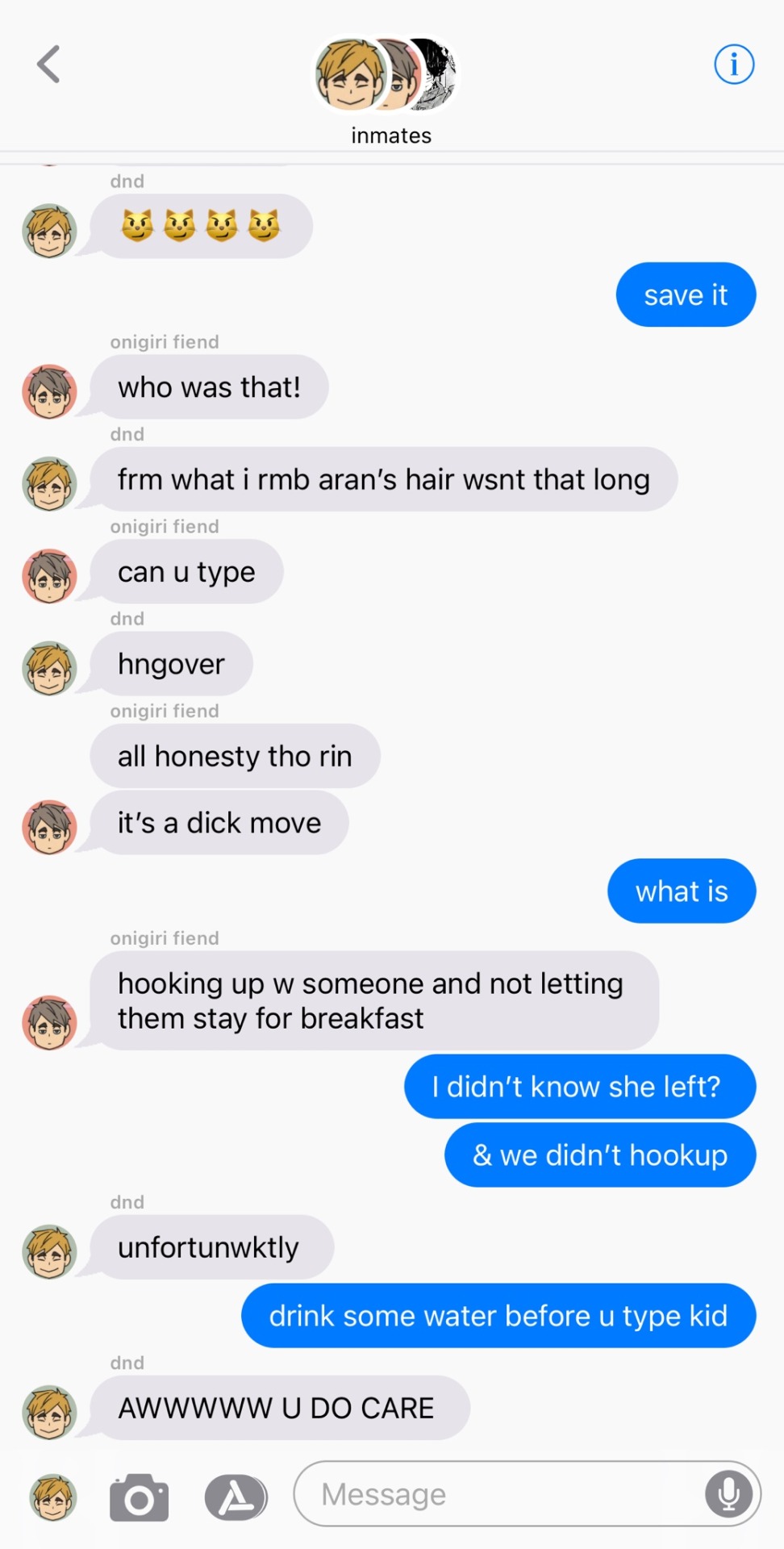
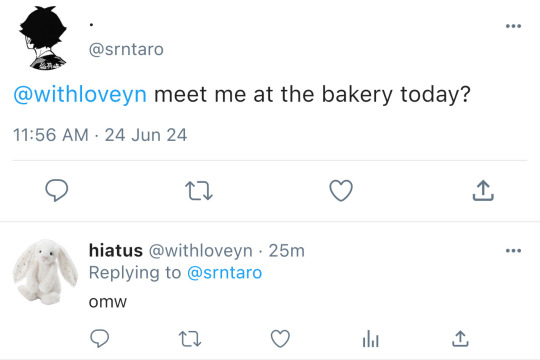

on the steps in front of the bakery, there’s a shared silence between you – he finishes the pastry you gave him. you enjoy his company.
it smells like dew and fresh bread.
“how much do you owe?”
“out of everything you could ask me, that’s what you choose?”
he licks jam off his thumb, and catches you getting distracted. “what else would I ask? for your number?” coy.
you look away. “I guess not.”
“why’d you leave without saying? I would’ve made you breakfast.”
“I wouldn’t have let you. plus I needed to get outside. my… ex, texted me. jeez. sorry. tmi.” you’re grimacing.
if he’s bothered, he doesn’t show it. “boyfriend?”
“of 3 years, yeah. douchebag ended it over text, told me not to spread the news because it would make him seem like a jerk.”
eye contact. whether or not it’s pity, you take the opportunity to admire. his eyelashes are long; if you squint enough you notice the speckles of green in his irises.
“ass”
“..what?” you snap out of it.
“he seems like an ass.”
you bite back a smile. “i… that’s one way to put it.”
“there’s no way I’m not paying you for that pastry, if you must know. if you keep giving freebies out, how are you gonna pay the debt you won’t disclose to me?” half-joking, you assume. why does he care so much about the money you lose?
“it’s a lot of money.” you think about telling him.
“didn’t ask that.”
“3 million yen.”
“…oh.”
“suna—“
“call me rin.”
“okay. rin,” you suck in a breath. “I’m perfectly fine with how I manage my finances now, thank you very much, and I sort of owe you.. for.. the other night.” you close your eyes, kicking yourself in your head. why’d you say it like that? made it sound like you did something else..
you’re about to apologize, but he laughs, “I was just trying to have a conversation with you, not become your accountant—“ you open your eyes.
he wanted to say
“you have the sun inside of you and it’s not just smiles. you have an internal being that shines so bright it’s taken my heart in one single night—a childlike spark I hope you’ll never lose. you’re a walking love letter that I will never open out of the fear that I’m falling for you harder than I’ve ever wanted to fall for anyone else. I hope you open that letter. learn to love yourself and heal from the things you don’t speak about. I hope you find someone who brings out the softness in you, not the survival. you deserve that and more.”
instead he said “—and no problem. you’re worth the trouble.”
but that was enough for you. enough for you to feel the same way about him. about each other, yet say nothing about it.
“I need your number if you wanna text. we’re heading back to tokyo today.” rin adds.
“okay. tell the miyas I’ll miss them.”
mentally, he replaces their names with his.
“I will.”
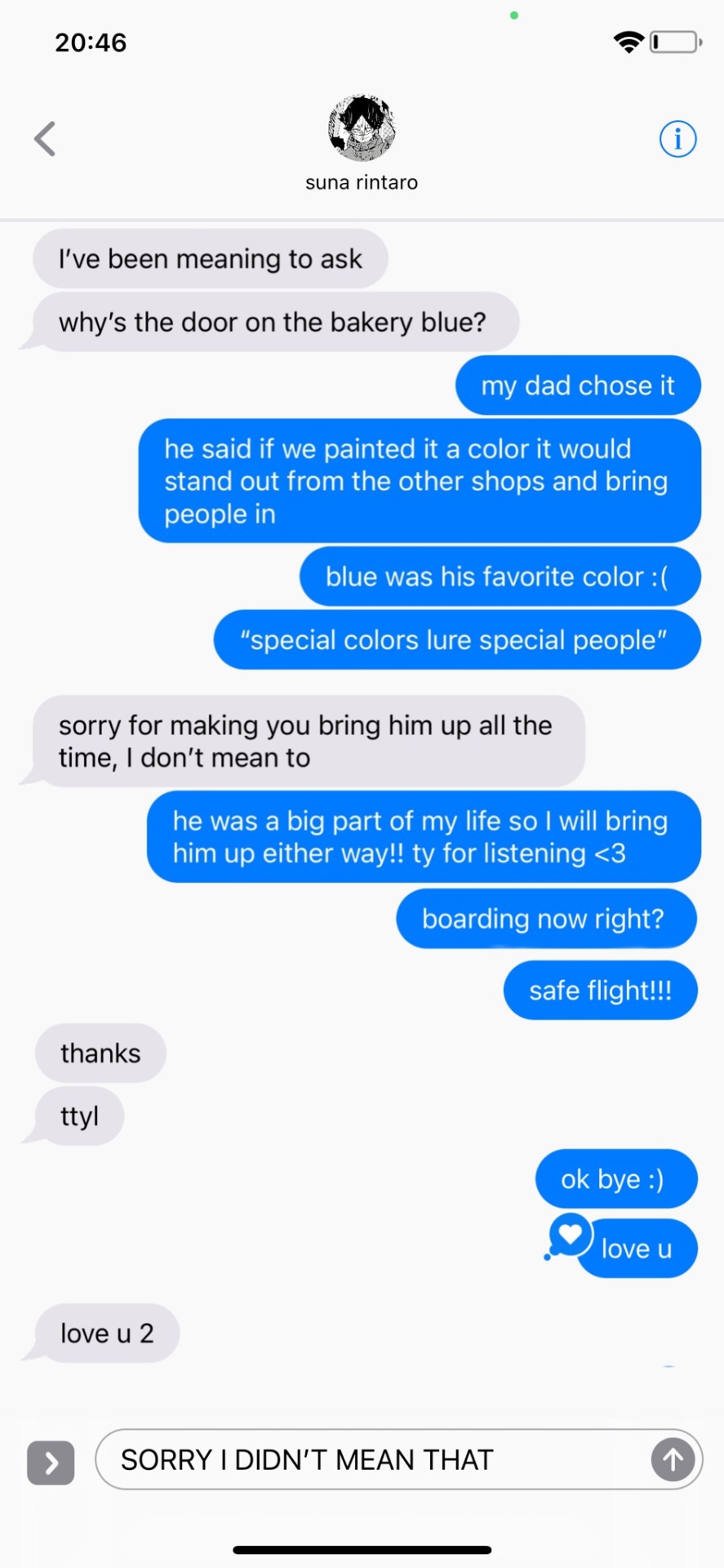
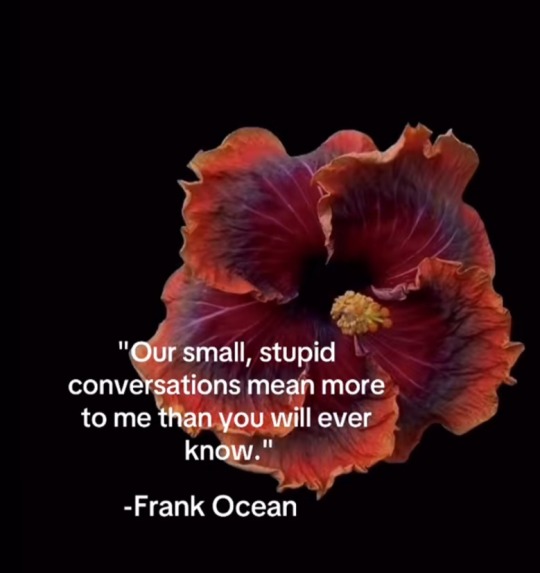
────────────────────────
author’s note: my musicals phase is making a comeback bc tell me why this took me 2 hours instead of the 20 minutes it shouldve took? (hamilton soundtrack start to end, half of the heathers soundtrack, i watched a bit of newsies & watched a cover of eurydice’s parts in hadestown BC ITS MY DREAM ROLE IM SUCH A THEATRE KID GOODBYE — or gretchen from mg)
ness ur truly my motivation to keep writing this smau even tho im slowly running out of inspo for the social media part of the smau 😭 send thoughts & prayers writers block is kicking me in the butt
i feel iffy about this one 😓😓

@phoenix-eclipses @thechaosoflonging @yuminako @nbcvs @tenjikusstuff4 @intergalacticrory @sonicsolos @yenonnoff @wyrcan @cnnmairoll @causenessus @reads-stuff-quietly @giocriedpower @applepi25 @gra-eae @lilchubbyyy @thvvluvr @toges-cough-syrup @steiins @girlkissersco @wolffmaiden @iluvaquaphor
#hq x reader#haikyuu x reader#haikyuu smau#hq smau#smau series#haikyuu#suna x y/n#suna rintaro x reader#suna x reader#suna x you
149 notes
·
View notes
Note
I frankly think a lot of the problems that plague the far left and their honestly downright abusive behavior towards anyone they deem "liberal" is the same thing that's caused so many problems from the far right in general:
The master/servant dynamic.
I saw an interesting post somewhere that posits that people interpreted the American ideal of social movement and the like in a deeply warped way, in that rather than seeing it as a chance for one to gain and move up the world alongside their fellow human being, that they instead just see everyone as an obstacle for them to step on to reach their own heights, all while sneering down on those same people when they get what they want.
I think there's a similar element at play with the master servant dynamic, in that I think many of the people shouting down on liberals for "failing" subscribe to a deeply warped understanding of what liberal leadership are supposed to be:
Namely, on paper, the ideal situation is that voters and leaders both have their own responsibilities and roles in the social contract between them, where voters must hold the leadership accountable, but the leader is also the result of the voters' own choices regarding them. Hence why a bad leader is partially the fault of the voters and the latter must bear responsibility for that leader coming into power.
What I think instead happened is the warped master/servant dynamic is at play: namely, certain leaders and certain voters instead believe that their relationship is basically all take and no give, that THEY are the masters who can abuse, brutalize, demonize and generally mistreat the other part of the social contract, while the latter is expected to take the abuse and do whatever the "master" wants them to do without complaint, and that their own lives and agency and humanity are essentially forfeit.
And this is the root of a lot of the anti-liberal behavior I've seen as of late: They don't see liberals as people who are trying their best under bad circumstances; they see them as worthless servants who aren't giving their "superior" master exactly what they want while getting nothing in return, or outright dying with a smile. There is no equal responsibilities, no acceptance of the complexities each face; only the expectation of submission from their victims to feed their need to feel dominant.
interesting,
I for sure agree that there's a element to American success that people view their personal success as purely personal, no matter what help they got, and often bitterly resent anyone having an "easier" time of it than them.
I remember reading about a Mexican illegal immigrant who was "proud" of her two American sons voting for Trump. The thrust of it was she found the wallet of a Nicaraguan refugee who had TPS, so a legal immigrant, and she was outraged that he had some different aid money (the article didn't say but I think she robbed the poor guy's cash, and it wasn't clear she gave back the wallet) But basically she was so mad about this legal immigrant getting help she never did she was happy to have her son's vote for Trump even though she still doesn't have legal status. So now the Nicaraguan lost his TPS (Trump has set Nicaragua to expire in July, basically all TPS programs are shutting down in the coming months) and she'll still get deported, and Trump wants to take her sons' citizenships away.
idk if I see the relationship between voters and electeds as a master-servant dynamic though
hm, how to articulate, one dynamic you see all over, though its particularly clear in dictatorships, is much of the public give up on "politics". The idea is that politics is for other people, "we're not political" the not only are you personally not "political" political is for a totally different type of person, a different class of person, from you, you are utterly removed from it.
I think in America, one there's just a lot of people who feel that way, thats why about 40% of the people didn't vote at all in the 2024 election. Also I think that view, or at least the idea that all politicians are the same, corrupt, self enriching, dirt bags, who are again an "other" removed from normal society and not like you or anyone you know, helps Trump bigly, because one he's "not a politician" and two if you say "my god he's so corrupt!" to a certain set of supporters the answer is "so what? all of them are"
where was I going? oh okay, I think this idea has entered a new and strange evolution in America, where there are people who aren't disengaged from politics and the news about politics, they aren't apathetic, which is the usual "we're not political" view, they would say "I am political" "I'm a leftist/progressive/socialist" HOWEVER they maintain the politician as other view. Like with rightists and Trump they have a handful of anti-politicians, Bernie Sanders or AOC they like, I think thats why you sometimes get overlap.
I remember a Bernie volunteer in 2016 telling me that a popular phrase in the Bernie field office was "A Trump voter is just a Bernie voter who hasn't been educated yet"
so you have a weird disconnect, that politics is done by some other class of men, and not for "you", but also deep rage at the "system"
finally I think, we just live in a lazy age? with the internet its easier than ever to sit and home and do nothing and not be bored, I have half a dozen tv shows I've been meaning to watch and 3 movies on my laptop, I have an audio book on my phone I've paused to type this, Bluesky is open if I need to make a pithy remark about the politics of the day, I'm answering you. So in that context effort, going to boring meetings and hearings, traveling to your state capital or DC, knocking doors, making phone calls, writing letters, post-cards, emails etc for your politics, its effort and no one wants to be asked. You can tweet in 30 seconds get the "rush" like you did something and then watch 10 TikTok videos. It's why you see so many protests, or boycotts that seem to have no meat to them, going out and marching with a sign for a couple hours with friends is fun, did you sign everyone there up to volunteer? no? well nonetheless... And boycotts well everyone seems to have decided how they interface with capitalism, and particularly entertainment media is the ultimate moral and political litmus test, again because I think "politics is for other people" so "I don't watch TV shows with problematic characters" is more meaningful to a lot of people than "I'm a member of my local Democratic committee" when clearly the latter does a lot more good for the world than the former.
Also I guess that also nets back to American individualism in the influencer age. Everyone wants to be famous for being themselves and, like.... hmmm in 2016 I lead a campaign field office, in a swing state, we knocked tens of thousands of doors. The difference between our Democratic Senate candidate and the Republican? 1,017 votes, we knocked 100 times that number of doors out of my office, the volunteers I trained 4 shifts a day for the last 2 weeks? they brought that election home. And in 2017, Republicans tried to repeal Obamacare the ACA, it failed by a single vote, the Senator I helped elect made all the difference. I'm not going in the history books, no one will ever credit me, but there's a very direct line between me getting up at 5am on Election Day to put door hangers on hundreds of doors, and millions of Americans having health coverage.
People don't want that, a part of a collective story that matters, they want to make a video that gets a million likes or whatever, they want to be the star and get the credit.
29 notes
·
View notes
Text
Another 5 Character Types the World Needs More of (Part 3)
Part 1 Part 2
I did not expect these two posts to continue getting notes. So. Here’s some that didn’t make the cut and a few new ones.
1. Character who is immune to everyone else’s bullshit
This can either be funny or a breath of fresh air. I’m talking your drama cast of 15 all losing their minds over “he said/she said” and fixating on so many ridiculous and arbitrary problems… meanwhile Chuck over here is skinned with teflon and completely immune to tropes like manufactured miscommunication or drama, who’s juuust shy of being genre savvy to Get Shit Done like this is their second time around the block and they are not happy to be back.
The first one to pop into my head is Soundwave from TFP. He has no voice actor for 99% of the show and doesn’t have a face and is only the focus character for like, 2 episodes, but whenever he’s on screen you can just see “I’m surrounded by idiots” playing on repeat in his head. This con is brutally efficient, never messes up, and is never wrong and while everyone else is caught up on ladder-climbing and revenge quests, Soundwave is over here vibing and keeping the whole cause together.
2. The Femme Fatale, but a man
This is not sexy suave abusive asshole hero you’re supposed to root for, who’s a male power fantasy. This is literally the exact same trope, but a man. Meaning, he gets the same revealing uniform, the same “I’m letting you think you’re in charge but really I’m pulling all the strings”. Crucially, he’s straight, because most of them are gay-coded (because the man being in the submissive, ‘girly role’ is horrifying, he must be gay). This dude weaponizes toxic masculinity, making the villains extremely uncomfortable and throwing the villain’s own power fantasy back in their face.
This dude unabashedly flirts with his captors just to get in their heads, removes all concepts of personal space, and makes straight villains seriously question their sexuality. He has social engineering down to a science. I’m sure there’s one that exists, but every one I can think of is already queer-coded and that’s not good enough. So just. Black Widow. But a man.
3. Mary Sue/ Gary Stu who becomes the villain
Since these characters are the product of insecurity and lack of self-awareness… the example for this trope is Titan from Megamind. This character is absolutely the hero of their own story, practically perfect in every way. They think they’re the best at everything without trying, flawless in features and personality, and everybody loves them. And genuinely, they are just that good.
So good, that they live long enough to become the villain. Obviously people who write Mary Sues with full sincerity have no idea that anything’s wrong or problematic, but a genuine Mary Sue whose perfection is their greatest flaw without them even realizing it would be an interesting villain because I’m getting sick and tired of “sympathetic” villains who are really starting to feel like excuses for abusers to be abusive because they were smacked around as a kid.
4. Paragon who is wrong, but also right?
Apparently I’m in a Transformers mood today. There’s an episode where the Autobots’ medic/second in command does the whole “desperate scientist tests their invention on themselves with horrible results” trope and he gains the strength and speed he otherwise hasn’t had in like, eons, and starts kicking ass and taking names (and committing war crimes) to the point where his team is like “uh, buddy, slow down a bit, you’re starting to act like a Decepticon”.
The best part of that episode is where Ratchet (medic) completely unloads on Optimus about how he’s too soft, about how he’s had a million chances to end the war and murder Megatron (which is true) and yet Optimus lets the window pass again and again still hoping for Megatron’s redemption… while in the process, countless Autobots keep dying, collateral keeps happening, all because Optimus is stubborn and won’t just get it over with.
We know Ratchet is right, because throughout the next season, Optimus is a bit more… shall we say, ruthless, in trying to legitimately end the war, Megatron’s redemption be damned. But that episode ends with Ratchet nearly dying when trying to kill Megatron himself, and understanding that the Autobots are Autobots for a reason, because they’re “good,” and sinking to the enemy’s level won’t be a good foundation for a peaceful post-war survival of their species. Point being, sometimes being a Paragon is an incredibly selfish virtue.
5. Parents who know what’s up
So, while I am a firm supporter in the dead parent cliché because parents are super inconvenient sometimes, when it’s not that kind of story and the parents are a big part of the plot… while also being idiots (like Disney and Nickelodeon sitcoms circa 2008), just to make the kids sound smarter, it’s just been done to death. Everything you could think of, your parents probably did when they were your age so having competent parents in the plot as a well-meaning obstacle that continues to surprise the hero is pretty rare in stuff like YA. Usually it’s “I must lie to them to keep them safe” meanwhile Sally Jackson is over here murdering her husband with Medusa’s severed head.
They don’t have to join the hero team, but parents painted as bumbling idiots is a disservice to the mischievous teenagers they used to be. Or just the parent who really does know the kid better than they do, like when kids anxiously come out and the parent is like “honey I knew since you were 3 let’s go get ice cream”. I didn't watch Glee but that one dad who was like "son all you wanted was a pair of sensible shoes, I knew." So yeah. Smart parents. More please.
#writing advice#writing#writing resources#writing a book#writing tools#writing tips#writeblr#character development#character design#tropes#cliches
74 notes
·
View notes
Text

Monogamism intersects with other systems of power
Our lives are intersectional and Monogamism is not the only system that matters. For people who date or marry, it’s obviously not their sole identity or activity (though their “relationship status” is treated as a key part of their social status, dictates the ways other people are “allowed” to interact with them, and is often the subject of great preoccupation). A critique of Monogamism, like other anarchist critiques of institutions and systems of power, illuminates the ways that the social mandate of monogamy denies many people the material and social resources they need. From an anti-monogamy perspective, many problems central to anarchist struggle (economic inequality, generational wealth, gendered violence, immigration and citizenship, oppression of children, homophobia, racism, etc.) work in concert with Monogamism.
For example, consider how Monogamism intersects with the role of the nuclear family under Capitalism. What better way to sell more products than to isolate people in small, controllable consumer units and equate success to purchasing things for them? Advertising shows us which gifts represent affection, date and vacation packages that promise connection, homes or cars one must have to be a desirable potential partner, and home accessories that shore up a perfect family.
The couple itself is romanticized and marketed to us as a proposition of ownership: a person who is ”just yours” and meets your emotional and domestic needs, especially with women and femmes stereotyped into caretaker roles. Success under Monogamism requires possessing a good partner, which opens paths to higher social status, opportunity, and happiness itself. To critique these modes of relating is not to demonize individual people struggling to meet their needs within the current coercive social system, any more than to critique Capitalism is to demonize workers. All the same, it is important to be critical of Monogamist harms, and to create supportive community that allows us to resist them together. Building relationships that challenge Monogamism is key to building resilient communities that can fight back against Capitalism and the State.
Considering how Monogamism intersects with other systems of power suggests questions that can inform our liberatory praxis:
Monogamism + Ableism: Who is expected to provide care for someone when they are sick or injured? What if they have a chronic illness or disability? What bundled expectations will someone with chronic illness be unable or unwilling to provide in order to get the care they need? In what ways are they pressured or coerced to please a primary caregiver? If care work is privatized, how will people know when it is inadequate or harmful? Why is it so common for people to be divorced once they become sick or disabled, and how can we support them when this happens?
Monogamism + Racism & white supremacy: Most couples in the US are not mixed-race. If resources are hoarded within the couple unit and nuclear family, how does this affect cross-racial bonding and resource distribution? When in a group, who will people stand up for or support? Are both members of a married couple US citizens or is one dependent on the other for legal status? How do legal and social pressure to appear more normative affect inter-racial relationships, or relationships between US citizens and non-citizens? How do settler-colonial ideas of family limit expansive ideas of kin or community?
Monogamism + Patriarchy & gender: How does the dominant ideal of Straight couples restrict the ways Queer people relate to each other? Why are the most celebrated Queer relationships the ones that look the most like Straight relationships? In so-called Straight couples (see “Straight Ally is an Oxymoron”), why do women and femmes still take on the majority of domestic and child-rearing responsibilities? Who is expected to do (more) care work, and why is it often one-sided? What work could be shared more effectively in community than in couple units? When relationships are “private,” how can the community know when gendered violence is happening and provide support? If desirability is linked to acceptable gender performance or presentation, how will people’s freedom of expression (and sense of self) suffer? Why are so many people seeking gender-affirming hormones or surgeries afraid of their partner “losing attraction” to them?
Monogamism + Capitalism & property: With whom do we share resources? What are we supposed to buy to demonstrate affection? Is it affordable or possible to live somewhere without a second person? Is there housing available that supports co-living outside the nuclear family? How do families prioritize their own generational wealth at the expense of community? How does economic dependence on family restrict who we can relate to and how we meet our needs? In what ways does “dating” lead us to view people (including ourselves) as marketable items, or encourage us to possess them?
Monogamism + Amatonormativity: How do people meet their needs and desires for touch? What expectations are bundled with those? Are people required to participate in complex social rituals around romantic dating to meet their basic needs? Whose idea of “romance” is used as the script for our relationships? What resources, opportunities, and support will be denied to people who pursue intimacy in ways stigmatized under monogamy? How do we build deep and intimate friendships without normative scripts around sex and romantic love? What do community ties look like when attractiveness and desirability don’t shape webs of material support?
Monogamism + Prison Industrial Complex & policing: Who is expected to support someone who is arrested and held in prison? Who bears the brunt of the negative effects of incarceration? How do institutional systems favor those in normative romantic relationships? Due to deplorable conditions and intentionally restrictive institutional policies, how are people excluded from reciprocal care and connection while incarcerated? In the context of the “rules” in rule-based relationships, how do people police and enforce those? How do people react punitively to broken relationship rules?
Monogamism is not separate from these other systems of power; they all work together. To approach monogamous relationships as if they are somehow insulated from these systems of power, or have no effects besides interpersonal ones, is to deny all of these intersections. In doing so, it pushes us further from discovering new ways of caring for each other and meeting our needs together.
#queer#Anti-monogamy#interpersonal relationships#intimate relationships#liberatory relating#marriage#non-monogamy#Praxis#queerness#relationship anarchy#relationships#anarchism#anarchy#anarchist society#practical anarchy#practical anarchism#resistance#autonomy#revolution#communism#anti capitalist#anti capitalism#late stage capitalism#daily posts#libraries#leftism#social issues#anarchy works#anarchist library#survival
11 notes
·
View notes
Note
what do you think maysilee thought when haymitch asked her to be his sister, with a presumption she started developing feelings for him, even subconsciously? i think few people thought about the possibility of maysilee hating that she was put in a sister role her whole life.
Funnily enough, I've already shared some of my thoughts re @ Maysilee and her family, although I could swear I wrote in here more about how Donners are set up to be Stepford smilers, only for Suzanne to never do anything with it. But oh well, apparently it was in oomf's dms. Definitely gonna touch upon it in Rust and Stardust one way or another, so no harm.
Anyways.
Let's start from the very last thing you touched upon, Anon: Maysilee and her feelings about being forced into a role of not only sister, but a twin her whole life. One thing we can say about Maysilee for sure is that she is individualist; whether she was like that from day one, or was it born from her disdain into being constantly forced to present herself as a part of an interchangeable duo, is like a chicken-egg dilemma. Both options are plausible, and regardless of what was first, the thing is, Maysilee is a teenage girl, who willingly puts herself in social scenarios, where she stands out of the crowd. I'm sure she loved Merrilee very dearly, but it doesn't change the fact that at the tender adolescent age you rarely want to be seen as anything else than unique, your own, special. Your mom still making you wear clothes matching with your sister definitely doesn't help with that - and we can assume Maysilee would pick different outfits for herself, judging by her insistence that it's not her choice how the twins are dressed.
We also need to look at Maysilee in a wider context. While I don't think this scene is entirely accurate to her situation, I think it describes pretty well, why Haymitch (and probably other people) have a problem with labeling her. She's a pretty girl, who likes girly things, but she also has foul mouth and isn't afraid of a fight, both verbal and physical. It does confuse people, and while I doubt Maysilee has vocabulary to describe this, I think it's something she takes pride in. It secures her status as an unique human being.
And then, in an intimate moment, Haymitch all of sudden is like 'hey, can I call you sister?? This is totally related to the fact that I was once supposed to have twin sisters who died before I even knew you, and they wouldn't be our age'. Even if we don't assume she had feelings for him at that moment, it must definitely sting because Maysilee is perceptive and observant, we've already seen it in almost all of her scenes. So she probably already noticed that in Haymitch's world, women really exist only in relation to him: his Ma, his virginal perfect girlfriend, his substitute sister Louella. It must sting to know that he's only able to accept her, when he fits her into one of those categories.
And honestly, I don't think her developing romantic feelings for him at that point, being it concious or not, would change much. I think, like most people at that age, who want to stand out for the crowd, Maysilee would be very critical of herself whenever she feels she steps into an unfamiliar ground. You know, like whenever she thinks warmly of Haymitch, she scolds herself how banal it is, to fall for a guy, who not only doesn't feel the same, but also has a girl back home, and he put that girl on a pedestal so high it's impossible for any real human being to reach it.
And sometimes he looks at her, and she forgets about that, the critical voice in her head suddenly gone.
And in one of those moments, he squishes her into the same box she desperately tried to escape ever since she learned how to walk. Moreover, he makes her face the reality that maybe she's not as smart, as she always thought, if she couldn't stop herself from falling for someone like that.
I don't think she was disappointed because she didn't expect a friendzone - honestly, even if we assume they both developed feelings in the arena (which I think is the case), Maysilee would never guess Haymitch's feelings. No, she was disappointed because even on the verge of death, she couldn't escape the labels she always tried to avoid.
(On a different note, I think that Merrilee loved or, at last, really liked the idea of them matching, so Maysilee never voiced her real feelings on the matter to her, to aboid hurting her feelings).
#sunrise of the reaping#maysilee donner#haymitch x maysilee#ask#this one turned way longer than i expected
8 notes
·
View notes
Note
Can i just say I am so sick and tired of people claiming genocide. I mean with saying Israel is committing genocide on Palestinians right now. Every time I see it I want to scream. This is one of the numerous reasons why the pro palestine movement sucks. They can't just say something is bad, focus on real grievances. Instead they have to exaggerate and claim everything is the worst possible version. They can't just say "palestinian civilians are suffering," or even "excessive civilian deaths." No. they have to claim genocide.
it’s disgusting. they are appropriating terms and watering them down in the process. genocide is a very real horrific problem that is ACTUALLY happening to people right now... and they have to claim that term for their situation because why? to paint israel/israelis as the ultimate evil? to claim this issue is the worst ever and insist everyone else drop everything and only care about this? to add more emphasis on their lies and propaganda of israel being a colonial empire practicing apartheid? intentional flipping because they know Jews have been victim to genocide (we see this more explicitly when they compare Israel in this war to nazis)?
Maybe part of it is that if israel is responsible for genocide, then there’s no need to acknowledge how HAMAS and their actions play a significant role in palestinian suffering? (It can't be that hamas steals aid for civilians, no it must be 100% israel’s fault and only theirs! Also joe Biden I guess! /sarcasm)
No matter what, it’s a cynical ploy and absolutely disgusting.
In some ways it reminds me of how people online have taken terms like “trigger,” “gaslight,” and more, and completely twisted and watered down their meaning, turned it all into a joke ... except obviously much worse, here.
what really grinds me up is seeing how many people are buying into this. especially gen z. I am so done with my generation honestly. im ashamed to be associated with these people. part of me doesn't get it. im not jewish. and i try my best not to be antisemitic, educate myself. it does take work, but also it’s NOT THAT HARD to just NOT post completely unverified stuff, NOT absorb your news from social media, NOT give accusations of genocide without doing any research, bothering to learn about historical context, actually understanding what experts say and explanations why it is not genocide? And most of all actually LISTEN to jewish people when they talk about their own history and heritage?
Im not saying this to say im so great, in fact it's the opposite: what im doing is nothing special and amazing. it's really BASIC. yet SO MANY PEOPLE fail this??? what the fuck????
I understand people cannot educate themselves on literally very single topic. But then if they are ignorant, then they should just SHUT UP and not weigh on something they didn't take the work to understand. That is not hard!!!! NOT casually throwing around accusations of genocide should be the bare minimum and yet here we are.
All of the above. I am sorry you are dealing with this from so many among your cohort, and deeply appreciate your commitment as a non-Jew to resisting the new Christ-killer / stab-in-the-back mythology. It will continue to be difficult. For decades - for CENTURIES - all the wealthiest and most educated people in societies worldwide "knew" the Jews were guilty of these terrible things.
Derek Chauvin was convicted of the second- and third-degree murder of George Floyd. There were people at that time who were upset he hadn't been nailed for first-degree murder - he was obviously guilty! Look what a horrible thing he did! Get him for everything! But there actually really are different standards of evidence for different crimes and if prosecutors had tried to go for that one they would have lost.
I don't doubt for an instant that the IDF has committed multiple war crimes during this entirely preventable, entirely pointless cataclysm. But people are racing past the crimes that are clearly visible and could be supported by evidence because they want - need - HOPE for the very worst one to be true. It is a moral obscenity. And you can tell how much they are enjoying themselves, how fine it feels to be able to invoke genocide against Jews and Uno-reverse that nagging Holocaust card, by how quickly they revert to petty Internet slang to silence counter-arguments: "lol WELL ACTUALLLYYY, so you're JUST ASKING QUESTIONS rite, nice SEALIONING." It is meant to be an inherently, automatically truthful claim, one that the Jew has no right to deny.
The Disputations of our time.
And as we did in the past... we must answer, because not-answering will not help.
37 notes
·
View notes
Note
hi! i was wondering if you'd be willing to do an analysis of the aromantic manifesto thats been going around? most of the ppl ive seen so far have been from either non-aro queer ppl or non-loveless aros and i cant find any loveless aros talking about it, and ik thats something youve talked abt b4 (loveless aros i mean) id love to also see your thoughts on it.
So funny enough I saw this manifesto a while ago, but didn't really have any thoughts on it because I had too much trouble reading it for brain reasons, because its just. A lot.
So @spacelazarwolf compared this to lesbian separatism/radical feminism and I think that is pretty apt. Radical feminism takes accurate criticisms of the patriarchy (such as gender as a tool of oppression and misogyny) and comes to the conclusion that gender is, in all forms, inherently oppressive, men are inherently oppressors, and that to personally identify with gender roles or men in any way contributes to oppression, so we must take on political lesbianism to reject this.
This manifesto seems to do the same with amatonormativity. There are real criticisms of amatonormativity in queer spaces here; aromantics have talked a bit about how focusing queer liberation on romantic love as a reason why we shouldn't be oppressed is alienating, and how queer spaces often reinforce amatonormativity. But it then comes to the polarized conclusion that romance is itself oppressive, identification with romance contributes to oppression, and that we must take on (essentially) political aromanticism to reject this.
Which, like political lesbianism, is just... unnecessary? This is not the only conclusion we can come to as a result of these criticisms. And these conclusions prioritize abstract political theory over people's real lives and autonomy. Which is a big reason (although not the only one) why radical feminism fell apart, because eventually women got tired of having to structure their entire lives and identities around acting out Good Political Theory instead of being able to. y'know. Be themselves? But also, these kinds of conclusions are so absolute and polarized. They assume that nothing about gender or romance can grow and be improved.
There are parts of this manifesto I like. The line "The first big ruse of romance is that it is ubiquitous because it is natural, and it is natural because it is ubiquitous" I think is actually pretty cool and can be adapted to all kinds of things; for example, capitalism does the same thing, taking over as much of the world as possible & erasing other ways of life, and then using its dominance as evidence thats its just how humans naturally are. It brings up criticisms of love that are big parts of lovelessness, like the idea that love is inherently a good thing when it can be harmful and still be "love."
But then it takes the... strange path of saying that if people can't help how who they love, then neither can racists and transphobes and fatphobes, which is why romance is inherently oppressive. But like. Even within relationship anarchy, where all hierarchies are rejected, this problem won't disappear. Its a problem of attraction & how social systems shape how we think.
I also disagree with how it frames private vs public life:
Public life concerns the interests of people as citizens and is regarded as a legitimate sphere of social intervention. Private life concerns the interests of people as consumers/individuals and is nobody’s business but those privately involved. While the domestic sphere fashioned by heterosexual kinship relations has been historically designated as private life, queer intimacies have instead been regarded as a matter of public concern due to moral panics associating them with predation and perversion throughout history.
I disagree with this framing of private life as something which is seen as "nobody's business." Maybe that's true on the small scale of social politeness and ideals. But on a systematic level, to me, this is absolutely untrue, and its something I've been doing some thinking about with regards to modeling the patriarchy.
The patriarchy is greatly concerned with the private lives of individuals. In order to keep its control over society in general via gender-sex-sexuality, its important to control how people interact with others. Even heterosexual, cisgender relationships haven't been free from patriarchal scrutiny; the wife must submit to the husband, the children must submit to the parents, and the queers must be kept outside the home. Again, on the level of neighborly politeness, people are going to say "what happens in the home is none of my business." But a relationship where the wife is the breadwinner and the husband stays at home is easily subject to scrutiny because it threatens the patriarchal norms, which causes unease.
Romance, as a construct, is a tool of oppression in multiple ways. But the physical reality the construct is built on top of is not inherently evil. The feeling of romantic love is not inherently corrupt, the same way the feeling of gender isn't.
Their advice for abolishing romance also feels kinda... vague and unhelpful and messy. I'm still not really clear on what "abolishing romance" even entails because most of the things they list can be done while romantic relationships occur. It just reads like they took the ideas of relationship anarchy and made it political lesbianism 2
I, as an aromantic, find the idea of political aromanticism to be pretty gross. I know how it feels to be pushed towards a certain relationship with romance and I don't want to seen it done in reverse, and tbh I don't like the idea of making my identity into a political stance. Being aromantic absolutely influences my politics, but its also my experience as a person. Again, similarly to why it would be uncomfortable to have lesbian spaces be full of women who are not in any way attracted to women but are making a political statement.
It disappoints me that this manifesto's conclusion is that romance itself must be rejected, the same way radical feminism does. Because there are good points here, but all-or-nothing conclusion, to me, is more divisive than connective and that's a big problem. My feelings about gender abolition are that, if we achieve true liberation from the patriarchy, our construction of gender is naturally going to be very different. Perhaps those people will no longer use gender, or they'll just use it differently- but trying to force a specific outcome is unhelpful and clashes with individual autonomy and culture for the sake of political theory. Same goes for this. Maybe in a post-amatonormativity world, "romance" will lose meaning, or at least be very very different. But trying to force that outcome isn't helpful.
Anyways I hope these takes were interesting! Honestly given how much arophobia I've seen I'm worried people are going to see this manifesto and get hostile to a lot of aromantic ideas. So I wanna suggest that people check out I Am Not Voldemort by K.A Cook, which is where the concept of "loveless aros" came from, as well as The short instructional manifesto for relationship anarchy by Andie Nordgren, which created the concept of relationship anarchy. Both of these essays do a much better job at criticizing love & amatonormativity than this manifesto.
185 notes
·
View notes
Text
2 cents from a friend of a friend. I have no horse in this race, just sharing someone else's perspective.
(Quoting my friend inside of quotes, outside of ✨️)
"Withholding credit per the author's request.
But I've known this person for just shy of a decade, and they don't hold back if they don't like someone. Speaking out in a positive way said enough for me to know what kind of person Brian must have been.
I trust their judgement in my daily life, I'll trust them on the character of someone they knew.
✨✨✨✨✨✨✨✨✨
Alright fuckers, listen up. You want the "insurance bad" thread? You got it. I was a business process architect at UHC for 8 years. I have seen all the data (some of the data being cited is likely from my old team). I have met and/or worked with the majority of the current and past execs. Some of them are absolutely blood-sucking vampires, but Brian Thompson was not one of them.
All the charts and data you see across social media are from 2021 or prior. You know when Brian Thompson became CEO? 2021. You know who was responsible for all the fucking evil shit you know about UHC? Steve Nelson, the former CEO who is now an exec VP at Aetna. I worked with Steve and Brian. They couldn't be more different. I likely know the next CEO too and I have a hunch on who it will be.
I was at a town hall one time when one of our data analysts asked, "Since 53% of our company is women, why are 70% of the leadership roles filled by men? What are you doing to fix that?" Steve Nelson stammered like crazy, tossed the question to the ONLY female exec, and ended the town hall. You know what BT did when he took over as CEO? Hired women into the exec roles. He increased female leadership across the entire company.
"But UHC denies more claims than everybody..." yeah, Steven Nelson did that. BT kicked off a program to eliminate Prior Authorizations for in-network providers. In 2023, 20% of all prior authorizations were removed. He was striving for 100% over the next 5 years.
BT just happened to be the face on which you can project your rage, but he's the wrong guy. If it were almost anybody else in the market, Steve Nelson, Andrew Witty, etc... I would agree with you. Steve Nelson tried to tell a "relatable story" once about conquering fear and his example was when he went helicopter skiing with his daughters and one of them was too scared to try one of the big jumps. THAT'S THE GUY YOU ARE LOOKING FOR.
It's no secret that I hate the entire idea of health insurance, but it's reality. "Being part of the system is part of the problem" is a childish take. The only way to fix the problem is guys like Brian at the helm. That guy was just murdered. I'm not a conspiracy guy, but based on the way this went down and how much misinformation about him is spreading, it feels like a hit. Stop and think before sharing that meme that slanders him.
✨✨✨✨✨✨
I work in the healthcare industry.
I'm chronically ill.
I've received denials and had to jump through prior auths in my personal and professional life.
I don't like the healthcare system. But I also don't particularly care for a person's murder being used as a tool for "change" when it's just people bitching online. That's not change.
So do something.
Do better. 🤷🏻♀️ "
13 notes
·
View notes
Note
People DO make up crazy stuff about gridania! The whole "the forest says we can't accept refugees" thing is like. Bad. But I think it's interesting to explore it in universe, considering that not that long ago, the ala mhigans invaded and burned parts of the shroud.
The elementals are powerful, immortal spirits, directly tied to the land. They are not human, and can't even really understand human language, thus the need for seedseers and the like. I find people who take the view that they must be evil or something to be missing the point of them entirely. They're pretty much a manifestation of a force of nature. Like, you wouldn't say a thunderstorm is evil, just because it can cause destruction.
And like, you don't need to make up crazy shit about gridania to bash it. There's tons of discrimination and social problems there!
i started up another character just for fun one day, and one of the things i did was take note of how many duskwight and moon keepers appear across the shroud and more importantly what they're doing. amusingly if your actually looking for it and counting, moon keepers seem to do pretty well in gridanian society serving in all manner jobs and roles across the shroud and its villages. in fact most of the npc moon keepers your likely to encounter in the shroud are either wood wailers or members of the gods bow.
comparatively you dont see nearly as many duskwights across the shroud. a part of that is that duskwights can be mistaken as wildwoods a lot easier [and in fact i think mother mirounne is a duskwight, which has a lot of interesting implications about her character], but it is something worth noting as i believe there are suppose to be more duskwight elezen in the shroud then their are moon keepers. both are majority populations in the shroud anyways, compared to negligible numbers of roegadyn and lalafells and what have you.
this is all to say that, gridania isn't perfect but it very much is a complicated culture of numerous layers and contradictions like any culture and society in the world of ffxiv. thats honestly what i like about ffxivs world building, not the "political" stuff which is underbaked but the microcosms of cultures and people that interact with these systems in messy and complicated ways.
so its just very funny to see people boil gridania down to "elf bashing but we aren't calling it that" to justify their cute anime mooncat girl oppression head cannons. and thats barely actually supported by the text when you pay a modicum of attention. with the additional funny implication that the duskwight kinda get ignored by the fanbase itself in favour of cute anime cat girls.
atleast thats the impression i've bitterly gotten
#final fantasy 14#final fantasy xiv#ffxiv#gridania#would you consider this a callout post? i sure hope its not#i just want good gridanian content thats all im asking for
7 notes
·
View notes
Text
Comfort and Joy (Even superheroes deserve the holidays off)
[All images are owned by DC Comics and Warner Bros-Discovery. I hope I’m too small-fry to sue…]
Nearly all of Justice League’s stories were told in multiple parts (usually 2, though there’s at least one that was told in 3) This is the only story told in a single episode, and is the warmest, fuzziest episode in the entire series.
If you would like to watch it, it’s available on Max or behind your favorite paywall.
We open on an alien planet. For some reason, the Justice League has been summoned (So are they the Justice League of America of the Justice League of the Universe?)
youtube
(Thanks to The World's Finest)
That doesn’t sound ominous at all…
Cue the opening credits!

After the Javelin takes off to return to Earth, we find John and Hawkgirl…

…having fun in the snow. Well, John is anyway. Hawkgirl doesn’t get it. So John shows her by building a snowman and making snow angels. However, Hawkgirl still isn’t impressed.
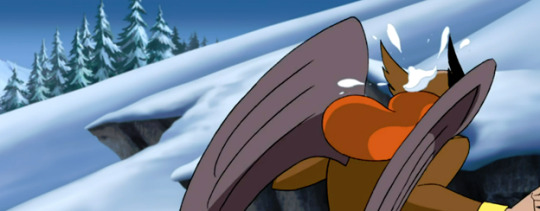
So he starts a snowball fight
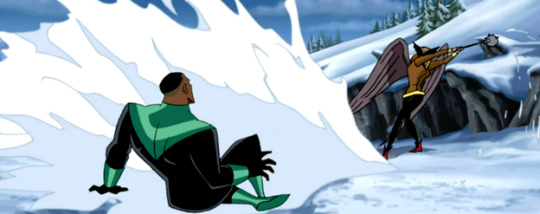
…with super powers!
Back on Earth, at Central City Orphanage, the kids are eagerly anticipating the jolly guy in the red suit.
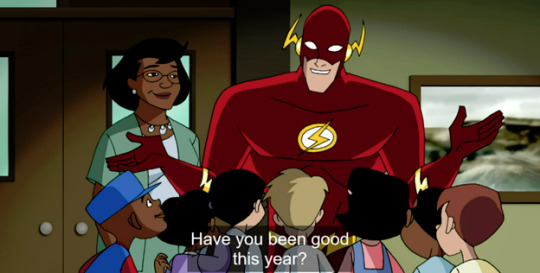
What? You were expecting someone else?
As is tradition, the Flash promises to get the kids one thing they all want (I’m guessing so it doesn’t suck so much to be an orphan) and they show him.
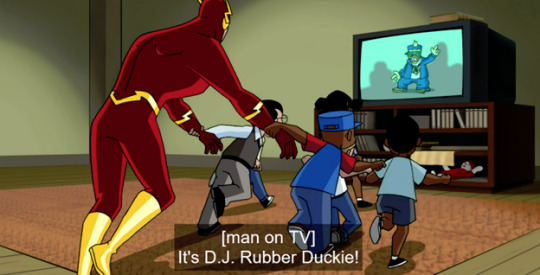
An animatronic doll of their favorite TV character, DJ Rubba Duckie (that raps and farts. I can see why the kids like it so much)
[QUICK NOTE: I know the captions say "RUBBER Duckie", but what the characters say sounds more like "RUBBA Duckie", so I'm going with that]
Just one issue: it’s the hottest, must-have-est toy of the season. As such…
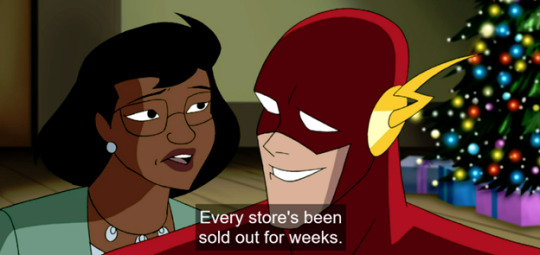
Flash doesn’t want to disappoint the kids, so he begins his quest. If you’ve seen Jingle All the Way (how have I not reviewed that yet?), you can guess how this quest will go.
Meanwhile, Superman has talked J’onn into spending Christmas with him and his adopted parents, the Kents. And so, in Smallville…
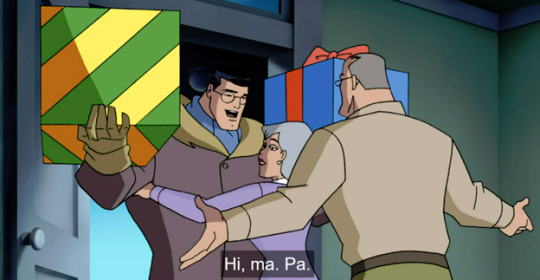
Clark then introduces his parents (Jonathan and Martha) to J’onn, who apologizes for imposing (despite Superman’s insistence)
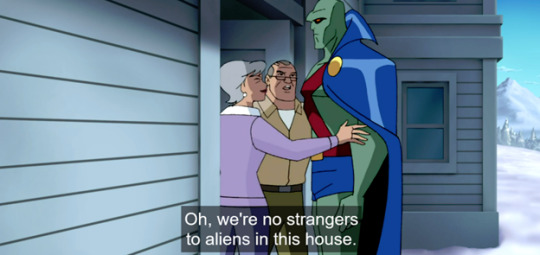
[FUN FACT: Jonathan “Pa” Kent is voiced by Mike Farrell, who was BJ Hunnicut on M*A*S*H]
[Personal note: I appreciate the fact that the Kents survived beyond Clark's teen years post-Crisis. It makes them more than what their role was before then: "These two people raised Superman, but they're not important now"]
It turns out Clark’s cousin Kara (AKA Supergirl) is spending the holidays with friends, so Clark offers J’onn her room. Clark is sure he’ll find it cozy.
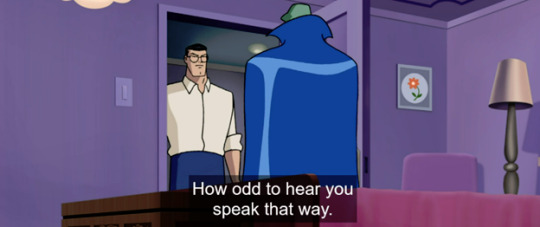
Clark explains he enjoys returning to Smallville so he can turn off “Superman” and be himself for a while. Then Clark rushes off to turn on the tree before Jonathan can do it. As J’onn processes this side of his teammate, the family cat enters. J’onn tries to make friends, but…
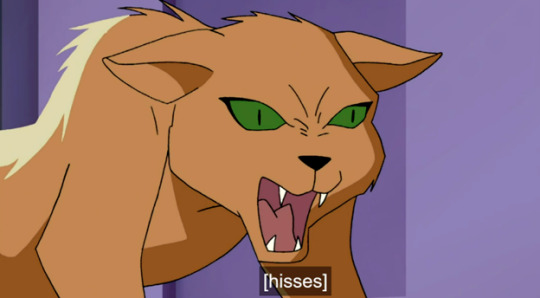
…before running off. That’s cats for ya.
Back on the ice planet, the snowball fight is in full swing!
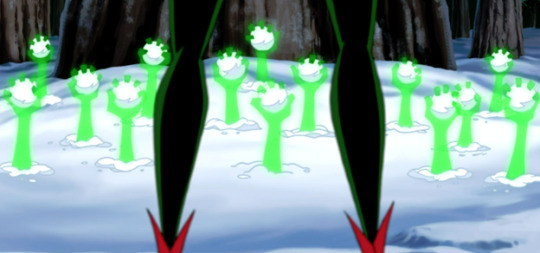
I think John officially wins this one.
Once the truce is called, Hawkgirl offers to take John to a planet that reminds her a bit of her planet of Thanagar.
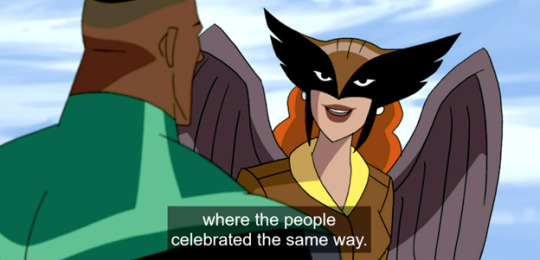
Given Thanagarians are warriors, I’m not sure I see this ending well.
Back in Central City, Flash is trying to find a DJ Rubba Duckie doll. No problem, right?
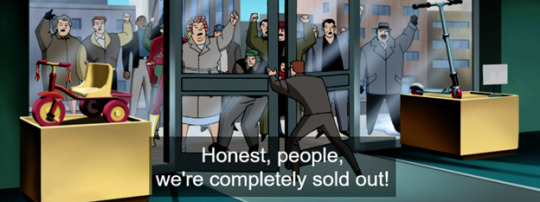
WRONG!
Flash tries 5 other stores and they’re all sold out. Suddenly he gets an inspiration.
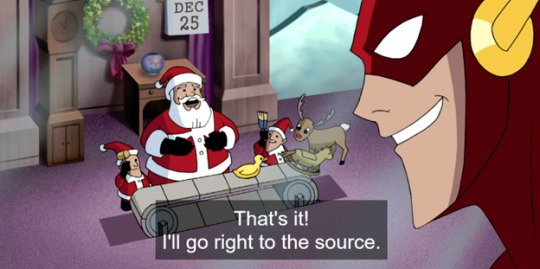
He’s not seriously going to the North Pole?!
Actually, he runs to Japan (he can do that. It’s documented he runs fast enough to skim across bodies of water)
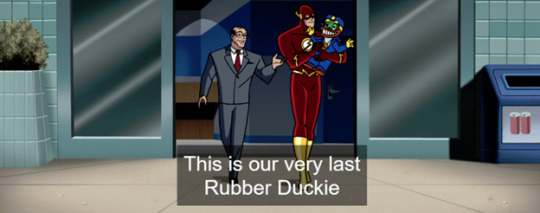
Well, that’s one way to beat the crowds, I guess. I wonder if he paid retail or wholesale, given he went to the manufacturer.
Back in Smallville, J’onn and the Kents are sitting around the table socializing after dinner.
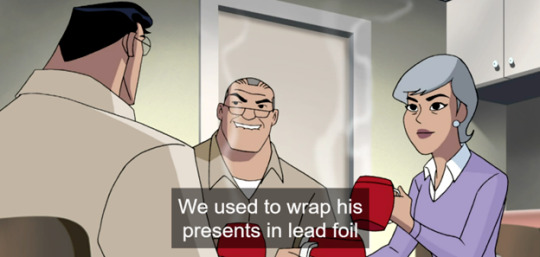
Martha then offers a gift to J’onn despite his protesting.
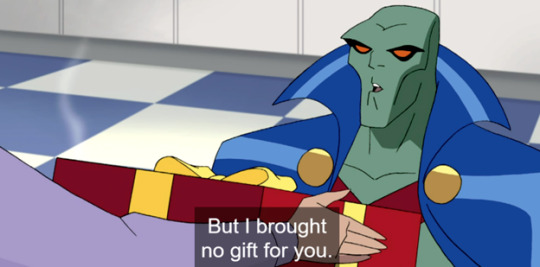
Martha insists that his company is gift enough. J’onn unwraps it, revealing a sweater (her women’s club knits a bunch for gift giving) Unfortunately, the size is…a bit off. Fortunately, J’onn is a shapeshifter.
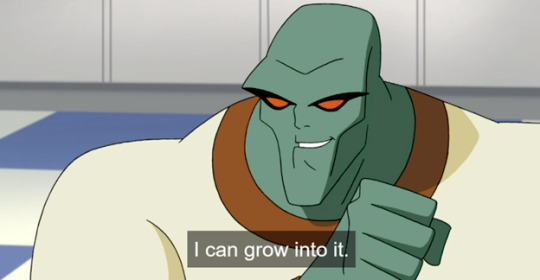
Wait, did J’onn just crack a joke? I think he might be warming to the whole “holiday” thing!
In outer space, Hawkgirl takes John to the planet she mentioned then heads straight to the nearest bar, where everyone seems to know her.
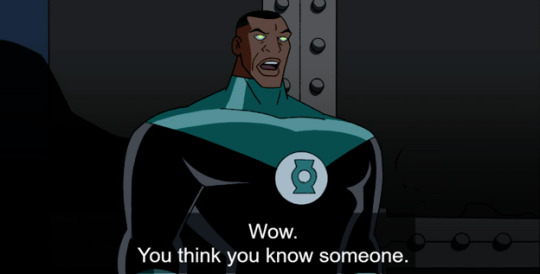
Hawkgirl drags John inside and bellies up to the bar, downing a tankard of whatever passes for alcohol. Then she livens up the place by sucker punching the brute next to her…
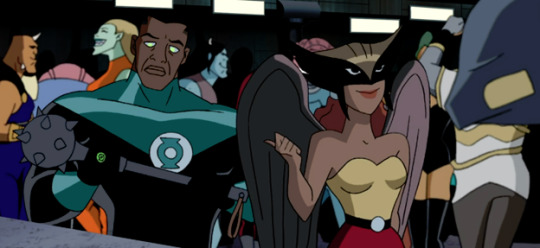
…and pinning the blame on John! The brute attacks John, which sets off a full-on bar brawl!
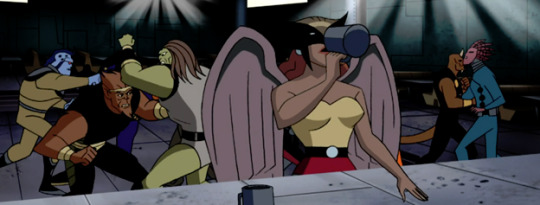
Hawkgirl has a weird sense of fun.
Back on Earth, Flash races back to Central City with his Rubba Duckie doll when…
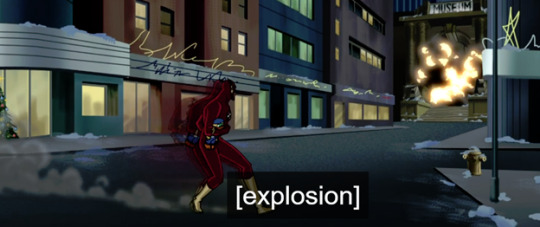
Oh, it wouldn’t be a Justice League episode without SOME villainy afoot! Flash goes to investigate to find…
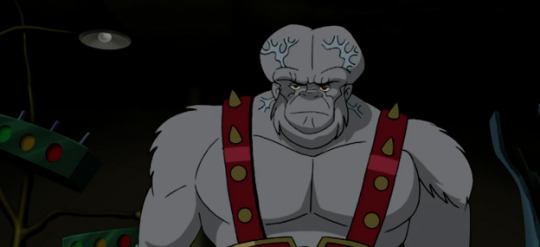
…the Ultra Humanite.
[FUN FACT: Ultra Humanite debuted in Action Comics #13 in 1939 as a mad scientist of great intellect but a failing body. Eventually, he began transplanting his brain into other bodies until finally winding up in the body of an albino gorilla]
youtube
(Thanks to rifandy cahyo)
Dare I ask what sorts of “improvements” Ultra Humanite has planned for Rubba Duckie?
As you saw at the end of that clip, we’re back in Smallville, where J’onn is still trying to understand Christmas.
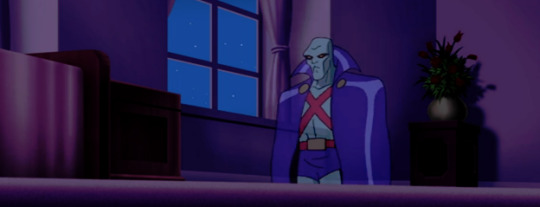
Therefore, he turns invisible and intangible, kind of like a “Ghost of What Is Christmas?” He then floats through the house and finds Clark still acting like…well, a kid on Christmas morning.
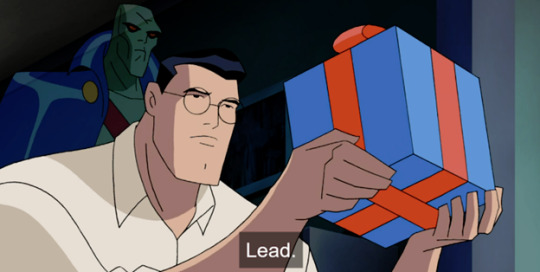
…and Jonathan hasn’t forgotten his son has X-ray Vision.
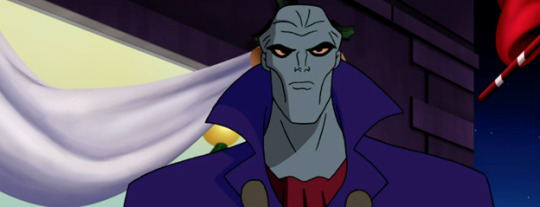
J’onn then floats into Smallville and shapeshifts into a human guise and walks the streets, observing until he sees a young girl staying up way past her bedtime on Christmas Eve.
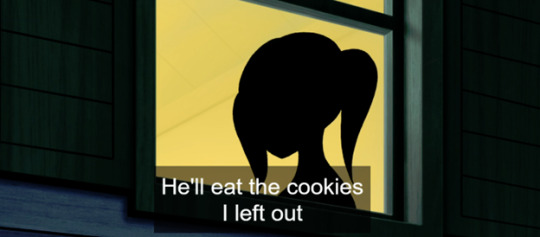
So he brings a bit of “Christmas magic”...
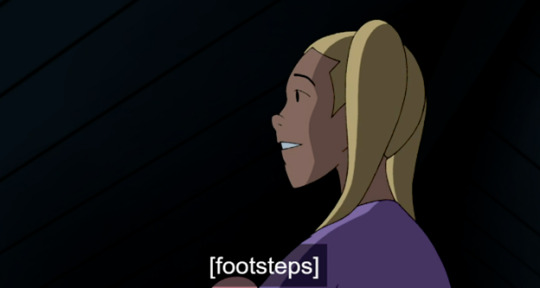
…by floating onto the roof and walking around
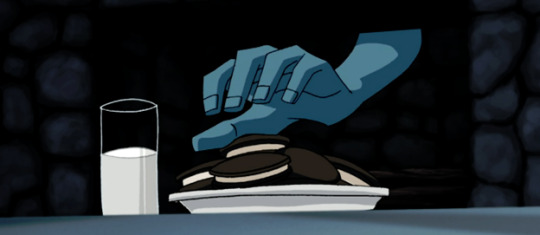
…and helping himself to some milk and cookies.
[FUN FACT: Starting in the 80s during the comedy period of the Justice League comic, J’onn develops an addiction to Oreos]
He then comes upon a church holding midnight mass.
youtube
(Thanks again to The World’s Finest)
Hope you enjoyed the warm feels. Happy Holidays, everyone!
#dc comics#dini verse#justice league#superman#martian manhunter#green lantern#hawkgirl#the flash#ultra humanite#christmas#fan colored glasses
11 notes
·
View notes
Note
I don't know if you've already talked about it, but if not or if even so, imma need you to talk about your Yellowjackets Omegaverse thoughts (please please please please please please)
THANK YOU!
Please be prepared for So Much Writing. I have so many feelings on the matter.
So first & foremost, I will say that most of these ideas can shift around, depending on the mood I'm in. Almost none of them are set in stone - I can be converted to just about any idea, if it's done in a way I find compelling!
Also, looking back at it, I'm noticing I have a lot of alpha headcanons. Idk if it's because I love female alphas, or because maybe it's the sort of person who'd join a soccer team, but either way, lots of them!
I tend to view Lottie as an alpha - specifically, an alpha who's been very out of touch with that part of herself, since she's been dealing with her medication leaving her disconnected from it. She's also viewing all of it through the lens of the Wilderness - "Shauna's baby must be super important, because I am so fascinated by her pregnancy & get all intense when I think about it" versus "oh hey, I've got a pregnancy kink," stuff like that. Goes into her first rut & has downright religiously ecstatic visions while jerking off. Maybe she'd earnestly talk about the fact that the Wilderness needs her to fuck… whoever, since. Well. Why would she be wanting to fuck them, if not for the Wilderness?
Travis I see as an omega, which is one reason why he gets so neurotic about masculinity - to say nothing about the fact that… well, he's a teenage boy in the nineties, which results in a lot of neurosis. Due to the starvation, he doesn't actually have a proper heat until spring, at which point he hides himself away in the middle of the woods & gets left alone for four days while he is a Mess.
Nat is also an omega - it's one of the reasons why her & Travis ended up bonding the way they do. I feel like a lot of Nat's anger at misogyny would circle in to having to deal with the stereotypes about omegas; the expectation to be sexually available or "easy", the social role that doesn't fit even if everyone else has it, the way people pre-judge… it just suits itself really well. It would also explain why she's so defensive & pissy - always having to be on her guard, in case people get the wrong idea. Maybe she'd go into heat in their village & they'd service her, since she's their leader. It's their job to take care of her, after all!
Misty is a beta. She's done extensive research into what being an alpha or an omega MEANS (& she reads so many romance novels about it, the studies, the… everything), but she can't pick up on the pheromones. In my view of omegaverse, betas are usually there as a neutral party - they don't set anyone else off, they don't cause problems, they generally are the ones with their heads on straight. My BFF has an idea involving Misty being a secret fourth thing (a delta) where she basically does the opposite; she sets people off. She sets omegas into heat, she sets alphas into rut, she's kind of just the spark that sets off the powder keg while, crucially, not being involved in it herself, because Misty will always be the outsider. Either works, really.
Jackie is also a beta - it's one of the many ways that she is so very Normal. Alphas & omegas aren't viewed as the types of people who can think straight - they're too distracted by their own hormones, by horniness, by all their Urges, which are not suited for civilization. It's one of the ways that Jackie doesn't feel like she belongs to the Wilderness. It's one of the reasons that Jackie ends up feeling so left out of everything.
Shauna is an alpha. An angry, hormonal alpha who's spent so much of her life trying to keep herself under wraps. One of the reasons her pregnancy is on the risky side is that female alphas tend to have more troubles with their pregnancies. Callie was also a difficult pregnancy (Jeff is a beta), & it's one of the reasons their relationship is Complicated. One of the reasons why Shauna ends up so out of control & angry, her hormones are raging, she's angry & sad & never been off suppressants for such a long time. It's all a mess, & she's just letting her temper & her grief & her frustration take control of everything else.
Callie is ALSO an alpha, & it's one reason why her & Shauna knock heads. Putting aside the fact that Shauna resents Callie being so different from Jackie - Jackie who was the prefect beta, while Callie is the stereotype of a teenage alpha, down to being slightly over confident & annoying. I feel like there used to be more discrimination against alphas & omegas back in the day (much like queerness), & I can see there being a lot of resentment involved in that. Along with all the OTHER resentment mixed in with their relationship to begin with.
Taissa I could see as an alpha or a beta. If she were a beta, I could see her digging her heels into being strong & smart & full of ambition, even though betas aren't expected to have any of that. I could also see her as an alpha who's very self conscious of what it means to BE an alpha (& a black woman, & a queer woman). I think that could ALSO feed into her ambition & her drive - I could see her having to explicitly say "this has nothing to do with me being an alpha, I've just got drive/ambition/whatever" which ALSO feels very in character for her.
Van I see as a very easygoing alpha. I love the idea of alphas being very good at… showing that they're providers. Van also comes off as a bit of a bully sometimes (especially in her treatment of Misty, if we're being honest), & I can see that being some of the stereotypical domineering alpha stuff. I love how… friendly she is, & how unashamed she is of being herself - I feel like her being an alpha would also playing into that. In a lot of ways I could see her being a stereotypical alpha - she takes care of people, she cares, she's a little bit doting. I think it would SUPER suit her.
Melissa would either be a beta or a baby alpha. I could see her being a beta & feeling like she's Important now because she's got Shauna's attention, & because in a lot of ways Melissa clearly is very normal (or at least, pretending to be normal). I like her as a baby alpha because it also feeds into the thing that Liv was talking about, where Melissa looks up to Van as an older lesbian, an older masc person. I could see her trying to learn how to be a good alpha in a similar way.
Akilah I could see as a beta or an omega - she feeds into the stereotype of being very nurturing & caretaker-y, but she's also very much… I feel like she's one of the baselines for a normal person in the wilderness? The story with her being pushed into the role of another prophet when she's just some person seems to really suit either of those, to be honest, & I dig it a ton.
Mari is so intensely a beta to me - she's so convinced that she's Normal, & I love that about her. She's a hater (complimentary), & she is SO convinced that she's the most normal person in the room, & everyone else here is a freak. She also always knows which way the wind is blowing - she always tries to cozy up to whoever is the top of the pecking order, if only in an attempt to keep herself safe - look at her & Ben!
Gen I don't have many specific thoughts about - I could see her in just about any direction, to be honest? I could see her as being an omega, & relating to Nat because of that. I could see her as a beta, because again, she seems very… normal, compared to everyone else. But then again, she could also be an alpha - the intensity of her loyalty to Melissa, for one! But not much otherwise.
… I did not realize it would be. Quite that long. But here you go, nonnie!
5 notes
·
View notes
Note
What exactly you didn't like in new da, if you don't mind asking? <3
Oof, where to start? There're quite a lot of things, not gonna lie, but most of them are spoilers so I'm going to stick to the non spoilery ones.
Let me begin by saying that I do like the game despite its clear flaws, and I understand that it must have been a tricky development with covid happening in between and a lot of important people who worked on previous games leaving. As a (somewhat of a) developer myself, I sympathise with that, but as a consumer I have to judge the end result I bought, and after waiting for a decade I just expected something more than what we got.
Putting my opinion under the cut because I get passionate about it. Hope you have time to spare, lol!
For starters, this game gets rid of the Keep and only has three choices to import. While most of the things in the Keep are not really important (especially since the game takes place in the north), that's already a bad start and rises serious concerns, mainly with the returning characters.
It also butchers half of the already existing lore, and contradicts another bunch of events that happened in previous games, like the Well of Sorrows. Harding talks about how the Inquisitor went to the altar of Mythal (which only happens if the Inquisitor drank from the Well), but then, during a conversation between Taash and Emmrich, they talk about how Morrigan turned into a dragon during the events of DAI (which only happens of she drank from the Well)
The pacing of the first half of the game is excruciatingly slow. There are a lot of parts that are there only to lengthen the game unnecessarily, and it can get very boring very fast.
The dialogues are... okay-ish, I guess? It's very obvious that they wanted to be socially correct. Way too much, in fact. They seemed so focused on being inoffensive that there’s little real conflict between characters or in the plot. There's a part where two characters apparently argue? Except that there's no real argument. I only knew because the game told me, otherwise I wouldn't have noticed because again, nothing really happened. And they were completely fine with one another after one conversation two minutes later.
All the companions feel rather dull to me, and some are incredibly annoying. For example, there was a series of quests regarding Solas that I enjoyed at lot, and the companions would get together to comment on it. It was a serious and very interesting subject, but then one of the characters would jump out of the blue to (try to) make some witty remark that only managed to take me out of the story.
Plus, the childish dialogue most of them have (all of them, really) doesn't help at all. Another problem of being socially correct in a game that's supposed to be dark. Most of the time, conversations with them feel more like talking to teenagers than adults.
And don't even get me started on how awful Taash's character is... And no, the problem is not their gender identity, but how it was handled. This ask I got about Albert/Lavina describes perfectly my problem with Taash.
Also, and this only happens with the spanish translation, why the fuck did they translate Harding's name? Why is the text calling her Encaje instead of Lace!? God, that pissed me off so much I ended up changing the text to english, lmao!
Lastly, what they did to some of the returning characters... Poor Isabela, smh. Thank goodness Morrigan doesn't have that big of a role, and that there's zero mention of the Warden and Hawke.
---
It's not as bad as I read in early reviews (thankfully!), and I'm still having fun with it. But I expected to get so invested that I'd end up making several runs like in previous games. Now I'm only playing once and probably forget about it for a long while. Hopefully when (if) I replay it I won't ditch it like I ditched my second run of MEA.
Anyway, TLDR: Mediocre at best. Good individual game, but pretty bad sequel. The only good thing this game does as a sequel is give those Inquisitors who romanced Solas a happy ending. That's pretty much it.
The name "Dragon Age" weights heavily on it. Probably the reason why I'm judging it so harshly.
Thanks for the ask, btw! That was entertaining xD Shame on me for spending more time writing this than a chapter of my story, lol!
#dragon age#dragon age the veilguard#don't take this as a review#i have no idea of what i'm talking about#ask
7 notes
·
View notes
Text
So who actually supports home education?
Idiots whose only experience of alternative forms of education is reddit posts made by survivors of the worst cases and cult documentaries may think its all "the guvment gonna take my guns and microchip me" types but what is the reality?
There of course will always be an amount of weirdoes, but these are not representative.
A huge proportion of those who home educate do it because of an understanding of child development and education methods. Unfortunately how schools educate does not match up with the science on how kids learn best. Many know this from experience as a large amount of home educaters are *teachers*. When you know better, you do better, and home education allows you to follow the science.
A significant amount have to withdraw their children from school due to the schools failing. This is not ideological, this is survival. Neurodivergent kids, kids with complex medical needs, and increasingly in the past few years, kids with or who's family members have immune disorders. A child cannot learn if their needs are not being met. Schools often resist meeting these needs for ideological or financial reasons, and LAs can be uncooperative for financial reasons.
Due to either dissatisfaction with schools generally on ideological grounds or as a result of rising high control environments in schools, parents may opt out due to beliefs. Some of these may be more right wing beliefs, but a lot, especially more recently, are due to more leftist beliefs. Many, even those of centrist and right wing beliefs, have always taken issue with the role of schools, be it a vague "they don't care about my kid, they only care about creating a worker" or actually naming the problem (capitalism). Schools will always reflect the government, which is a concern for many as a government becomes more facist. Many kids right now are being pulled due to the increasing anti-trans sentiment, either out of fear of what their child will learn or simply because their child is trans and not safe.
Curriculum can also be a reason people prefer home ed. A school curriculum must somewhat support all students, as well as the social and ideological goals of the government. A home ed curriculum caters entirely to the child.
Minority groups may often end up in home education due to other ingredients and lack of access. Travelling families may prefer to educate their children themselves rather than deal with changing schools. There are also many cases where attempts to address social issues due to perceived or actual extremism in religious communities further pushes these religious families away from the wider community.
Many people truly believe in the value of community, and see schools as robbing their children of the chance to truly be a part of their communities. Real world learning is incredibly popular and quite obviously not isolationist in nature.
Some lifestyles simply do not support schooling. Families who move a lot for work, children working in creative fields etc
And there are schools refusers. All kids deserve an education, even those who won't go to school. Kids are being driven to drug use and suicide by school environments. They are being bullied, physically assaulted and sexually abused. Parents in these situations just want their children to be safe.
The reasons people home educate are numerous and complex, and usually very good. The bad ones are not many. They just make better stories, so you hear about them more.
22 notes
·
View notes
Text

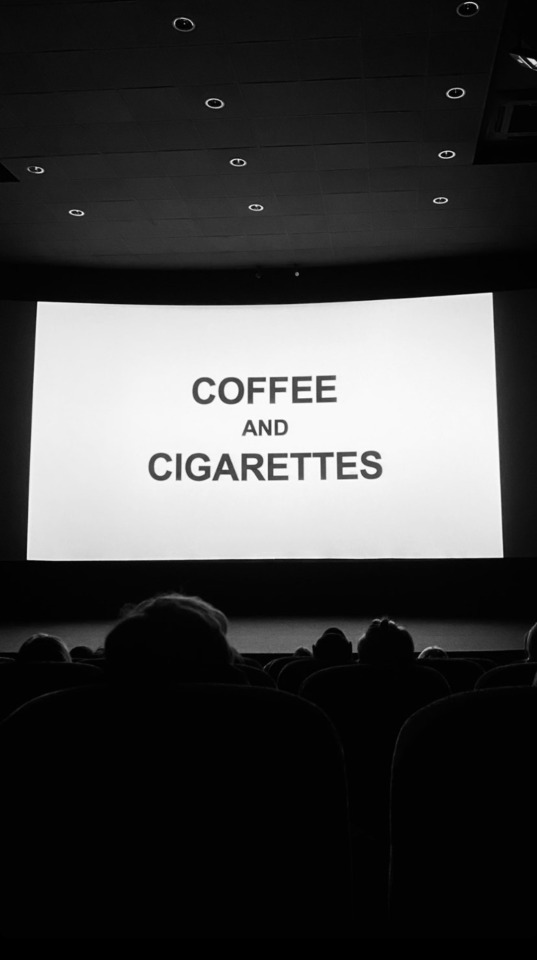
the second sex ; simone de beauvoir | part one
‘the second sex’ is a treatise on female autonomy. widely regarded as the blueprint for the second wave of feminism, this 900-page body of theory remains one of the most influential texts for women all over the globe. its impact is infinite, and beauvoir’s theory is masterfully cogent.
there’s a lot in here to reflect on and absorb. i’ve been tackling this absolute brick of a book by consuming 10 pages a day and allowing myself to really ruminate and sit with what beauvoir is putting out there. taking this book in small increments was definitely the way to go
simone de beauvoir begins by grappling with the question, ‘what is a woman?’ - an impossible question. woman is an ideal. a social reality and confinement the man constructs that pitches women in opposition to him as “the other”. womanhood is the condition in which a woman finds herself confirming a regulated hierarchy. however, beauvoir begins by answering this question through the biological. woman is a ‘womb, an ovary’. man reduces women to nature; they are mothers and reproductive catalysts. like the spider, she castrates and cannibalises; she consumes and eats men. beauvoir deconstructs the biological and the ways in which man has attributed inferiority to the natural biological difference between sexes.
biology, however, is not the foundation for womanhood. although it informs feminine existence, it isn’t the basis of gendered alterity and power disparity. beauvoir acknowledges biological subjugation while simultaneously stating that it is not reason enough for why women are the Other.
the question of ‘what is a woman?’ morphs into ‘what has humanity made of the human female?’ we must examine woman as a complete body, not in parts.
the concept of woman is examined from various schools of thought. from psychoanalysis - which is quickly proven insufficient due to freud’s misogynistic and male-oriented examination of sexual development, which is then generalised to women - to historical materialism and the role that economic value plays in female existence. beauvoir discusses engels - though classism is deeply connected to the disparity between sexes, it is not the origin of patriarchal oppression. female subordination pre-exists class divides. where the proletariat desires to erase class divisions, women do not want to be erased. we simply want to be registered in all forms. although the abolition of private property and class divisions is desirable, it will not ensure female liberation. and so, engels and marxism fail women.
this leads to a deconstruction of human history and the ways in which women were sacrificed on man’s journey for fulfilment and nourishment. as man went to hunt and build tools, women were frequently resigned to motherhood. as man conquer the world, women are left to watch from the sidelines. by dominating nature, man triumphs over woman. women become possessions like land. he is order and accomplishment; she is mystery and chaos.
as the socio-political landscape alters, the female condition continues to deteriorate. women face extreme abuse within the workforce, all for minuscule pay (and gender wage gaps DO still exist). this worsens with religion. simone de beauvoir delves into an array of theological beliefs - christianity, islam, and judaism being central focuses - and highlights the ways that each religion fails women. she also accounts for various cultural practises across the globe (from india to the mediterranean). this is very much a body of text that registers various different cultures and the nuances of each, respectively. i wish it reflected more on the nuances of non-white women’s existence within the western world, however.
i’ll end today’s overview with the most impactful line from this section for me - ‘women’s entire history has been written by men’. the problem of women has always been the problem of men. ‘it is not women’s inferiority that has determined their historical insignificance: it is their historical insignificance that has doomed them to inferiority’.
with man lies the onus for female suffering.
#the second sex#simone de beauvoir#reading update#literature aesthetics#books#book#bookish#bookblr#bookworm#bookstagram#dark academia#booklover#books and libraries#studyblr#study space#academia#study hard#study#movie#film#coffee and cigarettes#annotations#annotated books#cinema#beige#minimalism#feminist theory#feminism#studying#essay
79 notes
·
View notes